Strategic Globalization and HR Challenges
VerifiedAdded on 2021/05/03
|28
|4476
|60
AI Summary
The assignment focuses on the challenges of strategic globalization in emerging markets, emphasizing the need for companies to find a balance between global structures and local innovations. It highlights the role of HR systems and smart technologies in creating streamlined global operations while establishing local credibility through hiring capable people. The assignment draws from various sources, including The Economist, McKinsey, and Michael Page, to discuss topics such as labor market trends, employee turnover, values-based diversity, and managing virtual teams.
Contribute Materials
Your contribution can guide someone’s learning journey. Share your
documents today.

Secure Best Marks with AI Grader
Need help grading? Try our AI Grader for instant feedback on your assignments.
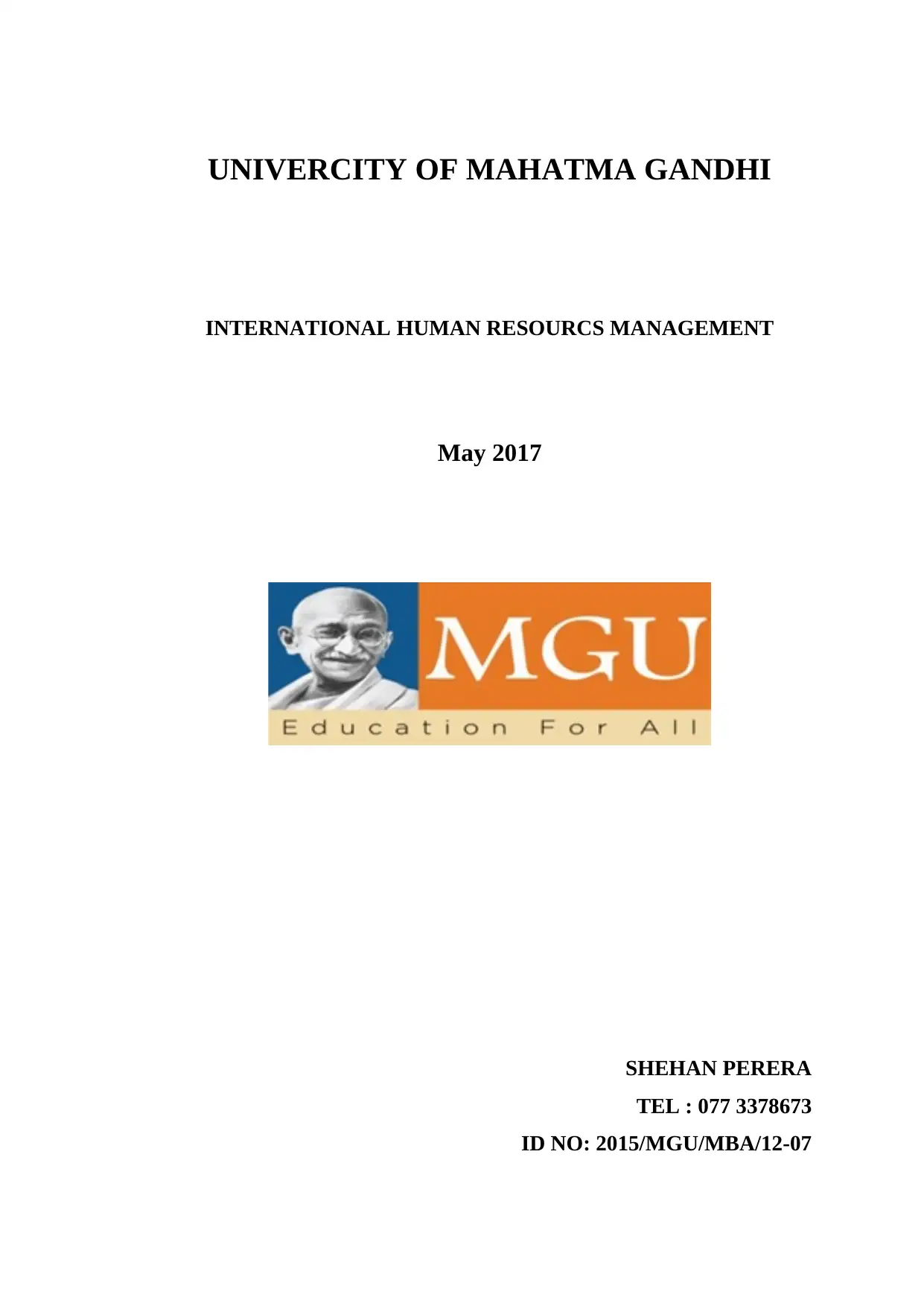
UNIVERCITY OF MAHATMA GANDHI
INTERNATIONAL HUMAN RESOURCS MANAGEMENT
May 2017
SHEHAN PERERA
TEL : 077 3378673
ID NO: 2015/MGU/MBA/12-07
INTERNATIONAL HUMAN RESOURCS MANAGEMENT
May 2017
SHEHAN PERERA
TEL : 077 3378673
ID NO: 2015/MGU/MBA/12-07
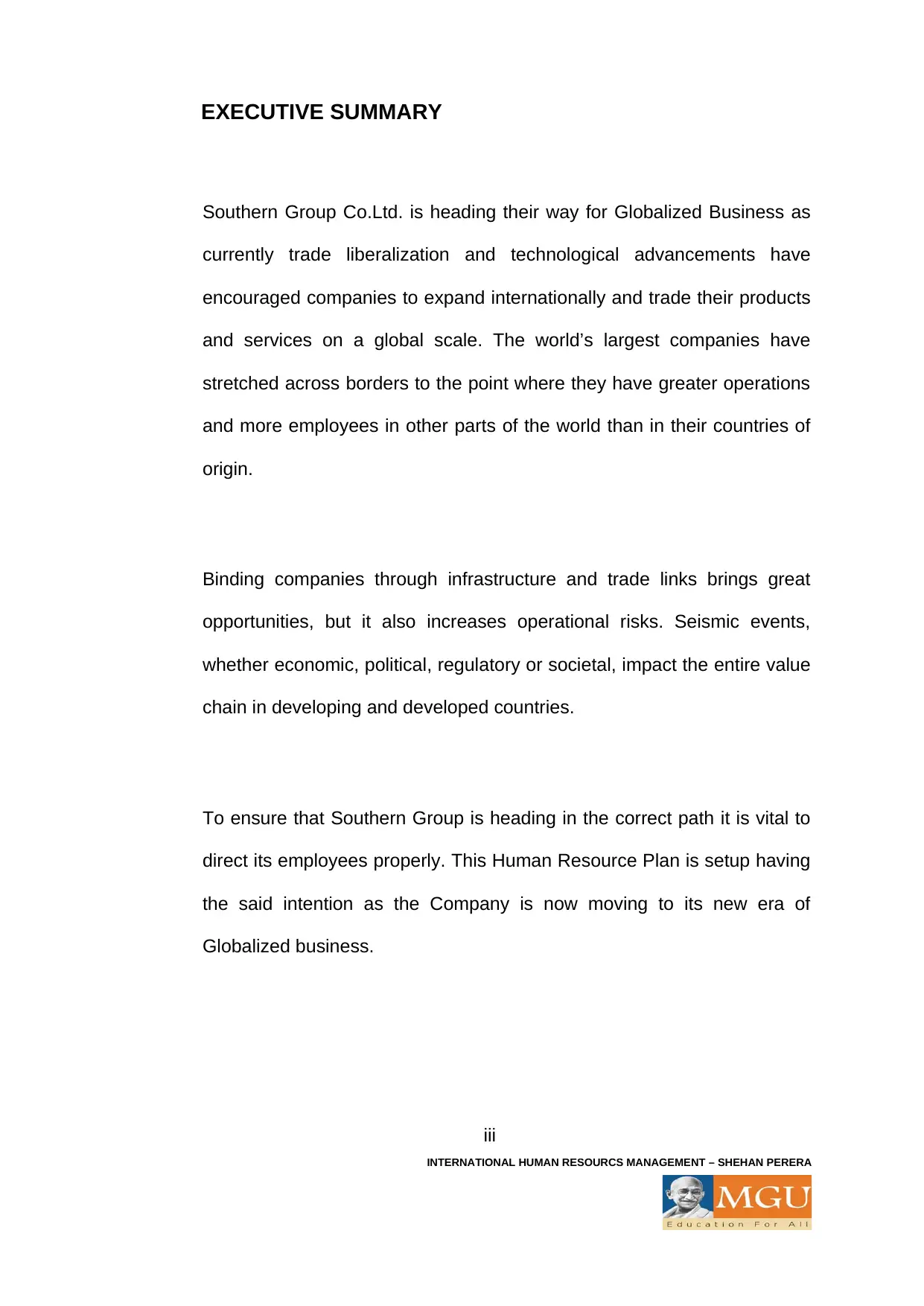
EXECUTIVE SUMMARY
Southern Group Co.Ltd. is heading their way for Globalized Business as
currently trade liberalization and technological advancements have
encouraged companies to expand internationally and trade their products
and services on a global scale. The world’s largest companies have
stretched across borders to the point where they have greater operations
and more employees in other parts of the world than in their countries of
origin.
Binding companies through infrastructure and trade links brings great
opportunities, but it also increases operational risks. Seismic events,
whether economic, political, regulatory or societal, impact the entire value
chain in developing and developed countries.
To ensure that Southern Group is heading in the correct path it is vital to
direct its employees properly. This Human Resource Plan is setup having
the said intention as the Company is now moving to its new era of
Globalized business.
iii
INTERNATIONAL HUMAN RESOURCS MANAGEMENT – SHEHAN PERERA
Southern Group Co.Ltd. is heading their way for Globalized Business as
currently trade liberalization and technological advancements have
encouraged companies to expand internationally and trade their products
and services on a global scale. The world’s largest companies have
stretched across borders to the point where they have greater operations
and more employees in other parts of the world than in their countries of
origin.
Binding companies through infrastructure and trade links brings great
opportunities, but it also increases operational risks. Seismic events,
whether economic, political, regulatory or societal, impact the entire value
chain in developing and developed countries.
To ensure that Southern Group is heading in the correct path it is vital to
direct its employees properly. This Human Resource Plan is setup having
the said intention as the Company is now moving to its new era of
Globalized business.
iii
INTERNATIONAL HUMAN RESOURCS MANAGEMENT – SHEHAN PERERA
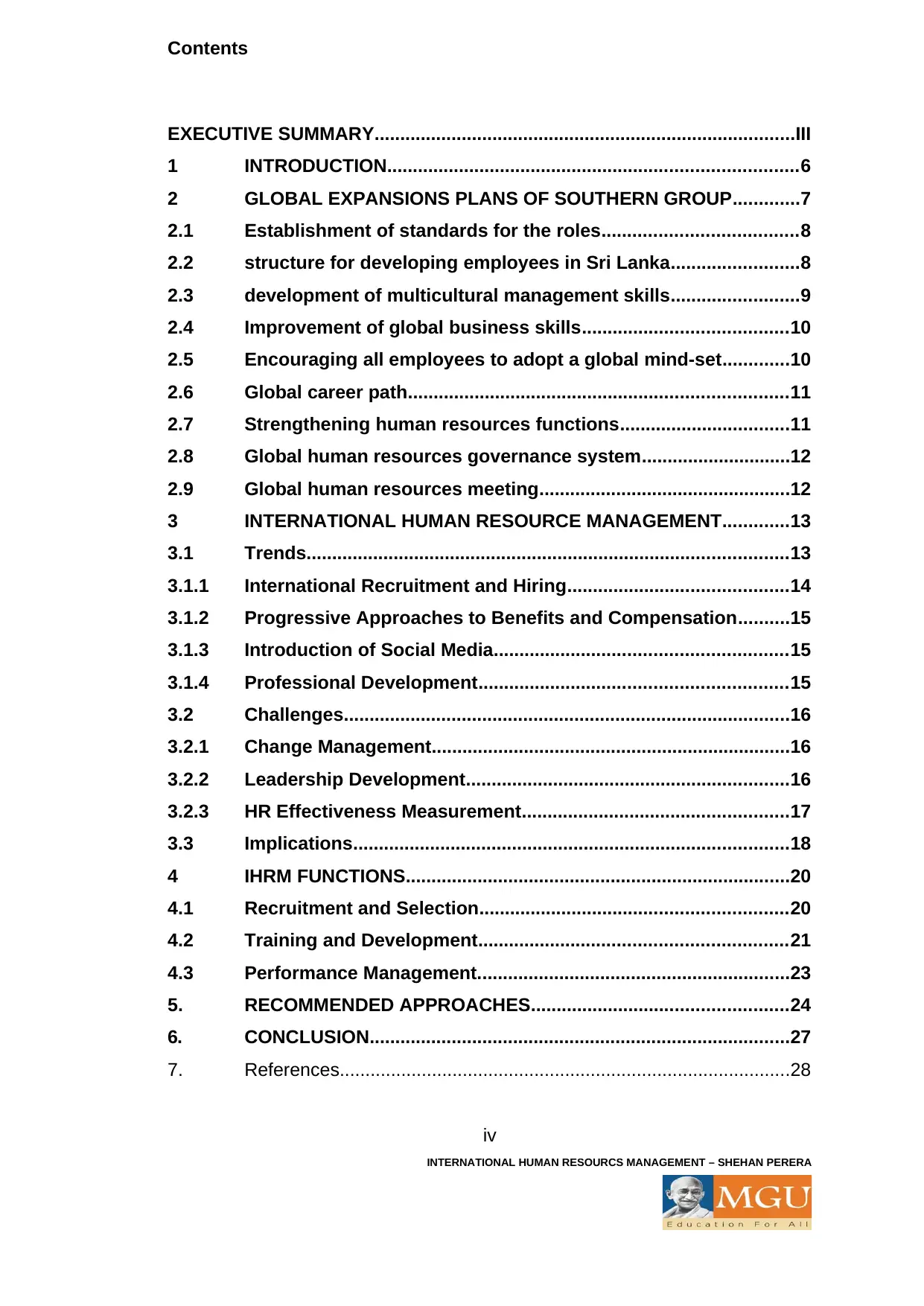
Contents
EXECUTIVE SUMMARY..................................................................................III
1 INTRODUCTION................................................................................6
2 GLOBAL EXPANSIONS PLANS OF SOUTHERN GROUP.............7
2.1 Establishment of standards for the roles......................................8
2.2 structure for developing employees in Sri Lanka.........................8
2.3 development of multicultural management skills.........................9
2.4 Improvement of global business skills........................................10
2.5 Encouraging all employees to adopt a global mind-set.............10
2.6 Global career path..........................................................................11
2.7 Strengthening human resources functions.................................11
2.8 Global human resources governance system.............................12
2.9 Global human resources meeting.................................................12
3 INTERNATIONAL HUMAN RESOURCE MANAGEMENT.............13
3.1 Trends..............................................................................................13
3.1.1 International Recruitment and Hiring...........................................14
3.1.2 Progressive Approaches to Benefits and Compensation..........15
3.1.3 Introduction of Social Media.........................................................15
3.1.4 Professional Development............................................................15
3.2 Challenges.......................................................................................16
3.2.1 Change Management......................................................................16
3.2.2 Leadership Development...............................................................16
3.2.3 HR Effectiveness Measurement....................................................17
3.3 Implications.....................................................................................18
4 IHRM FUNCTIONS...........................................................................20
4.1 Recruitment and Selection............................................................20
4.2 Training and Development............................................................21
4.3 Performance Management.............................................................23
5. RECOMMENDED APPROACHES..................................................24
6. CONCLUSION..................................................................................27
7. References........................................................................................28
iv
INTERNATIONAL HUMAN RESOURCS MANAGEMENT – SHEHAN PERERA
EXECUTIVE SUMMARY..................................................................................III
1 INTRODUCTION................................................................................6
2 GLOBAL EXPANSIONS PLANS OF SOUTHERN GROUP.............7
2.1 Establishment of standards for the roles......................................8
2.2 structure for developing employees in Sri Lanka.........................8
2.3 development of multicultural management skills.........................9
2.4 Improvement of global business skills........................................10
2.5 Encouraging all employees to adopt a global mind-set.............10
2.6 Global career path..........................................................................11
2.7 Strengthening human resources functions.................................11
2.8 Global human resources governance system.............................12
2.9 Global human resources meeting.................................................12
3 INTERNATIONAL HUMAN RESOURCE MANAGEMENT.............13
3.1 Trends..............................................................................................13
3.1.1 International Recruitment and Hiring...........................................14
3.1.2 Progressive Approaches to Benefits and Compensation..........15
3.1.3 Introduction of Social Media.........................................................15
3.1.4 Professional Development............................................................15
3.2 Challenges.......................................................................................16
3.2.1 Change Management......................................................................16
3.2.2 Leadership Development...............................................................16
3.2.3 HR Effectiveness Measurement....................................................17
3.3 Implications.....................................................................................18
4 IHRM FUNCTIONS...........................................................................20
4.1 Recruitment and Selection............................................................20
4.2 Training and Development............................................................21
4.3 Performance Management.............................................................23
5. RECOMMENDED APPROACHES..................................................24
6. CONCLUSION..................................................................................27
7. References........................................................................................28
iv
INTERNATIONAL HUMAN RESOURCS MANAGEMENT – SHEHAN PERERA
Secure Best Marks with AI Grader
Need help grading? Try our AI Grader for instant feedback on your assignments.
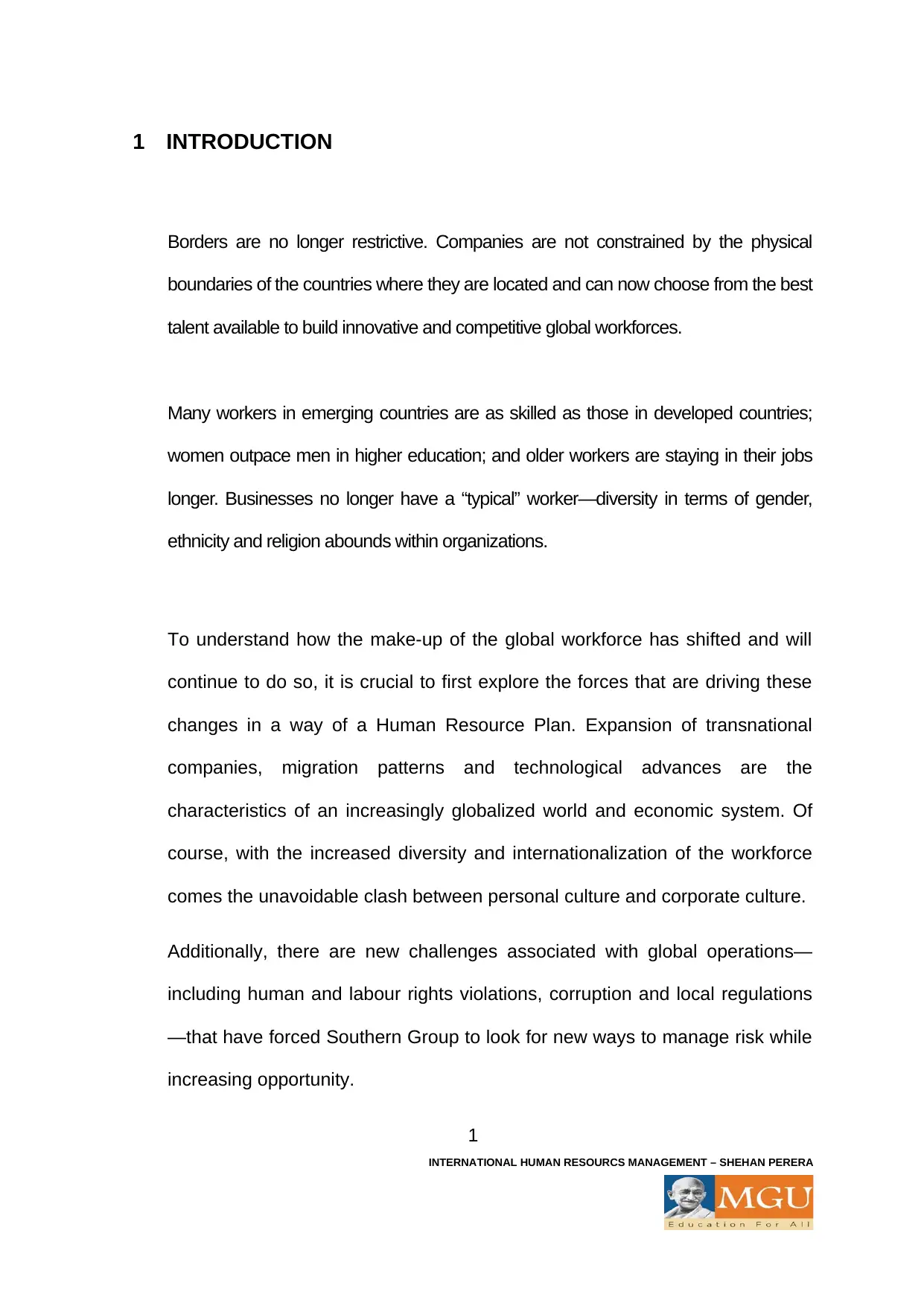
1 INTRODUCTION
Borders are no longer restrictive. Companies are not constrained by the physical
boundaries of the countries where they are located and can now choose from the best
talent available to build innovative and competitive global workforces.
Many workers in emerging countries are as skilled as those in developed countries;
women outpace men in higher education; and older workers are staying in their jobs
longer. Businesses no longer have a “typical” worker—diversity in terms of gender,
ethnicity and religion abounds within organizations.
To understand how the make-up of the global workforce has shifted and will
continue to do so, it is crucial to first explore the forces that are driving these
changes in a way of a Human Resource Plan. Expansion of transnational
companies, migration patterns and technological advances are the
characteristics of an increasingly globalized world and economic system. Of
course, with the increased diversity and internationalization of the workforce
comes the unavoidable clash between personal culture and corporate culture.
Additionally, there are new challenges associated with global operations—
including human and labour rights violations, corruption and local regulations
—that have forced Southern Group to look for new ways to manage risk while
increasing opportunity.
1
INTERNATIONAL HUMAN RESOURCS MANAGEMENT – SHEHAN PERERA
Borders are no longer restrictive. Companies are not constrained by the physical
boundaries of the countries where they are located and can now choose from the best
talent available to build innovative and competitive global workforces.
Many workers in emerging countries are as skilled as those in developed countries;
women outpace men in higher education; and older workers are staying in their jobs
longer. Businesses no longer have a “typical” worker—diversity in terms of gender,
ethnicity and religion abounds within organizations.
To understand how the make-up of the global workforce has shifted and will
continue to do so, it is crucial to first explore the forces that are driving these
changes in a way of a Human Resource Plan. Expansion of transnational
companies, migration patterns and technological advances are the
characteristics of an increasingly globalized world and economic system. Of
course, with the increased diversity and internationalization of the workforce
comes the unavoidable clash between personal culture and corporate culture.
Additionally, there are new challenges associated with global operations—
including human and labour rights violations, corruption and local regulations
—that have forced Southern Group to look for new ways to manage risk while
increasing opportunity.
1
INTERNATIONAL HUMAN RESOURCS MANAGEMENT – SHEHAN PERERA
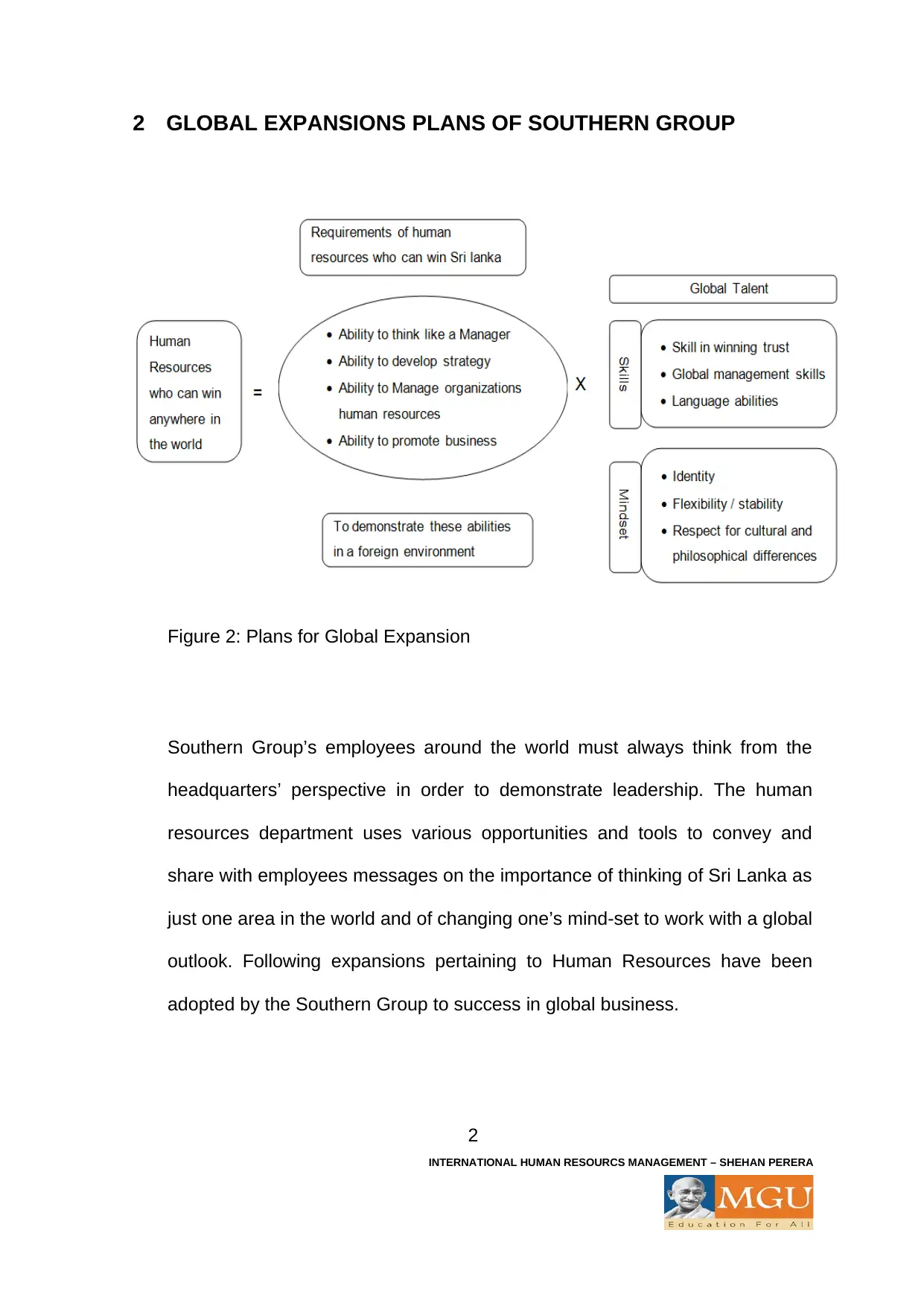
2 GLOBAL EXPANSIONS PLANS OF SOUTHERN GROUP
Figure 2: Plans for Global Expansion
Southern Group’s employees around the world must always think from the
headquarters’ perspective in order to demonstrate leadership. The human
resources department uses various opportunities and tools to convey and
share with employees messages on the importance of thinking of Sri Lanka as
just one area in the world and of changing one’s mind-set to work with a global
outlook. Following expansions pertaining to Human Resources have been
adopted by the Southern Group to success in global business.
2
INTERNATIONAL HUMAN RESOURCS MANAGEMENT – SHEHAN PERERA
Figure 2: Plans for Global Expansion
Southern Group’s employees around the world must always think from the
headquarters’ perspective in order to demonstrate leadership. The human
resources department uses various opportunities and tools to convey and
share with employees messages on the importance of thinking of Sri Lanka as
just one area in the world and of changing one’s mind-set to work with a global
outlook. Following expansions pertaining to Human Resources have been
adopted by the Southern Group to success in global business.
2
INTERNATIONAL HUMAN RESOURCS MANAGEMENT – SHEHAN PERERA
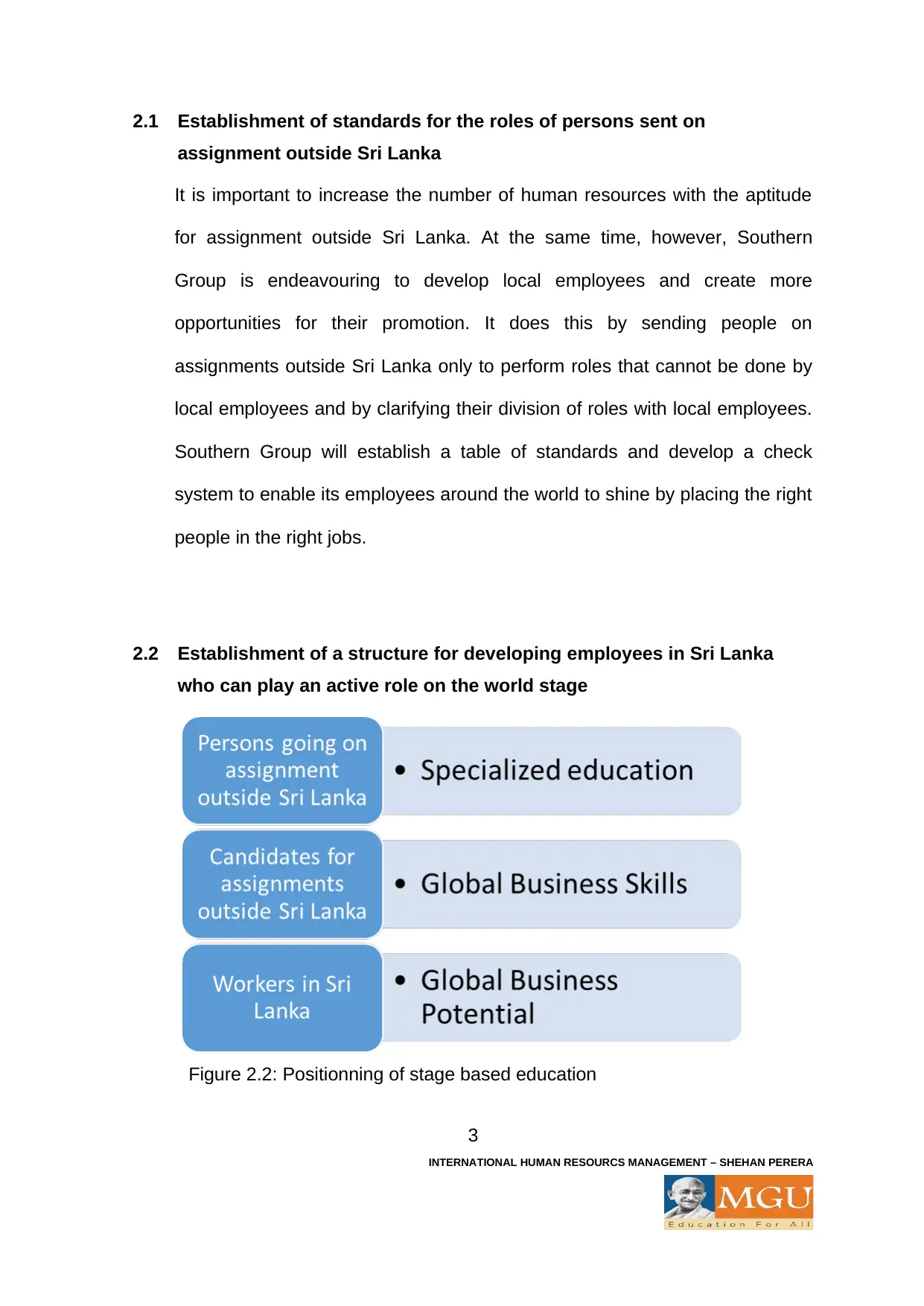
2.1 Establishment of standards for the roles of persons sent on
assignment outside Sri Lanka
It is important to increase the number of human resources with the aptitude
for assignment outside Sri Lanka. At the same time, however, Southern
Group is endeavouring to develop local employees and create more
opportunities for their promotion. It does this by sending people on
assignments outside Sri Lanka only to perform roles that cannot be done by
local employees and by clarifying their division of roles with local employees.
Southern Group will establish a table of standards and develop a check
system to enable its employees around the world to shine by placing the right
people in the right jobs.
2.2 Establishment of a structure for developing employees in Sri Lanka
who can play an active role on the world stage
Figure 2.2: Positionning of stage based education
3
INTERNATIONAL HUMAN RESOURCS MANAGEMENT – SHEHAN PERERA
assignment outside Sri Lanka
It is important to increase the number of human resources with the aptitude
for assignment outside Sri Lanka. At the same time, however, Southern
Group is endeavouring to develop local employees and create more
opportunities for their promotion. It does this by sending people on
assignments outside Sri Lanka only to perform roles that cannot be done by
local employees and by clarifying their division of roles with local employees.
Southern Group will establish a table of standards and develop a check
system to enable its employees around the world to shine by placing the right
people in the right jobs.
2.2 Establishment of a structure for developing employees in Sri Lanka
who can play an active role on the world stage
Figure 2.2: Positionning of stage based education
3
INTERNATIONAL HUMAN RESOURCS MANAGEMENT – SHEHAN PERERA
Paraphrase This Document
Need a fresh take? Get an instant paraphrase of this document with our AI Paraphraser
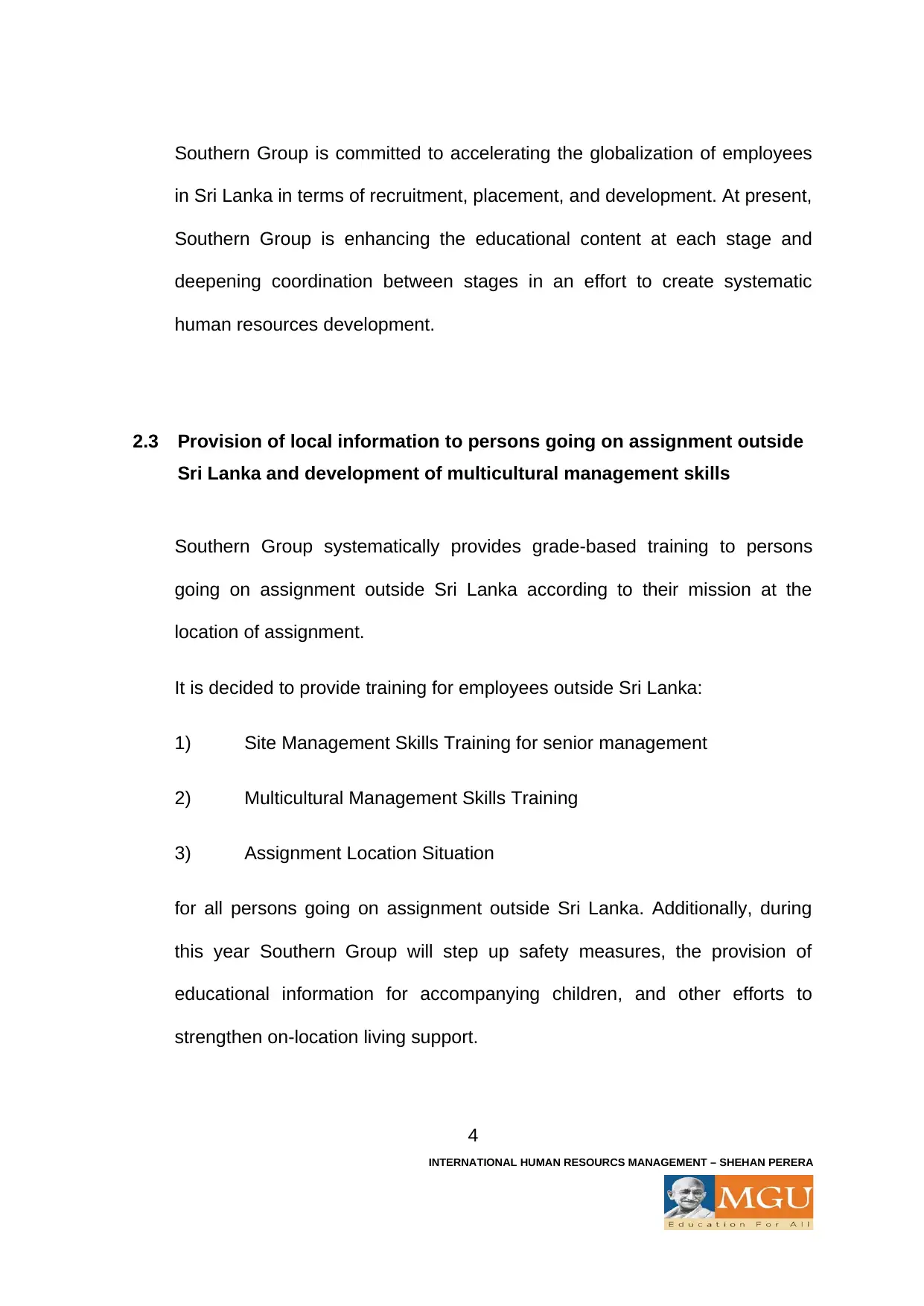
Southern Group is committed to accelerating the globalization of employees
in Sri Lanka in terms of recruitment, placement, and development. At present,
Southern Group is enhancing the educational content at each stage and
deepening coordination between stages in an effort to create systematic
human resources development.
2.3 Provision of local information to persons going on assignment outside
Sri Lanka and development of multicultural management skills
Southern Group systematically provides grade-based training to persons
going on assignment outside Sri Lanka according to their mission at the
location of assignment.
It is decided to provide training for employees outside Sri Lanka:
1) Site Management Skills Training for senior management
2) Multicultural Management Skills Training
3) Assignment Location Situation
for all persons going on assignment outside Sri Lanka. Additionally, during
this year Southern Group will step up safety measures, the provision of
educational information for accompanying children, and other efforts to
strengthen on-location living support.
4
INTERNATIONAL HUMAN RESOURCS MANAGEMENT – SHEHAN PERERA
in Sri Lanka in terms of recruitment, placement, and development. At present,
Southern Group is enhancing the educational content at each stage and
deepening coordination between stages in an effort to create systematic
human resources development.
2.3 Provision of local information to persons going on assignment outside
Sri Lanka and development of multicultural management skills
Southern Group systematically provides grade-based training to persons
going on assignment outside Sri Lanka according to their mission at the
location of assignment.
It is decided to provide training for employees outside Sri Lanka:
1) Site Management Skills Training for senior management
2) Multicultural Management Skills Training
3) Assignment Location Situation
for all persons going on assignment outside Sri Lanka. Additionally, during
this year Southern Group will step up safety measures, the provision of
educational information for accompanying children, and other efforts to
strengthen on-location living support.
4
INTERNATIONAL HUMAN RESOURCS MANAGEMENT – SHEHAN PERERA
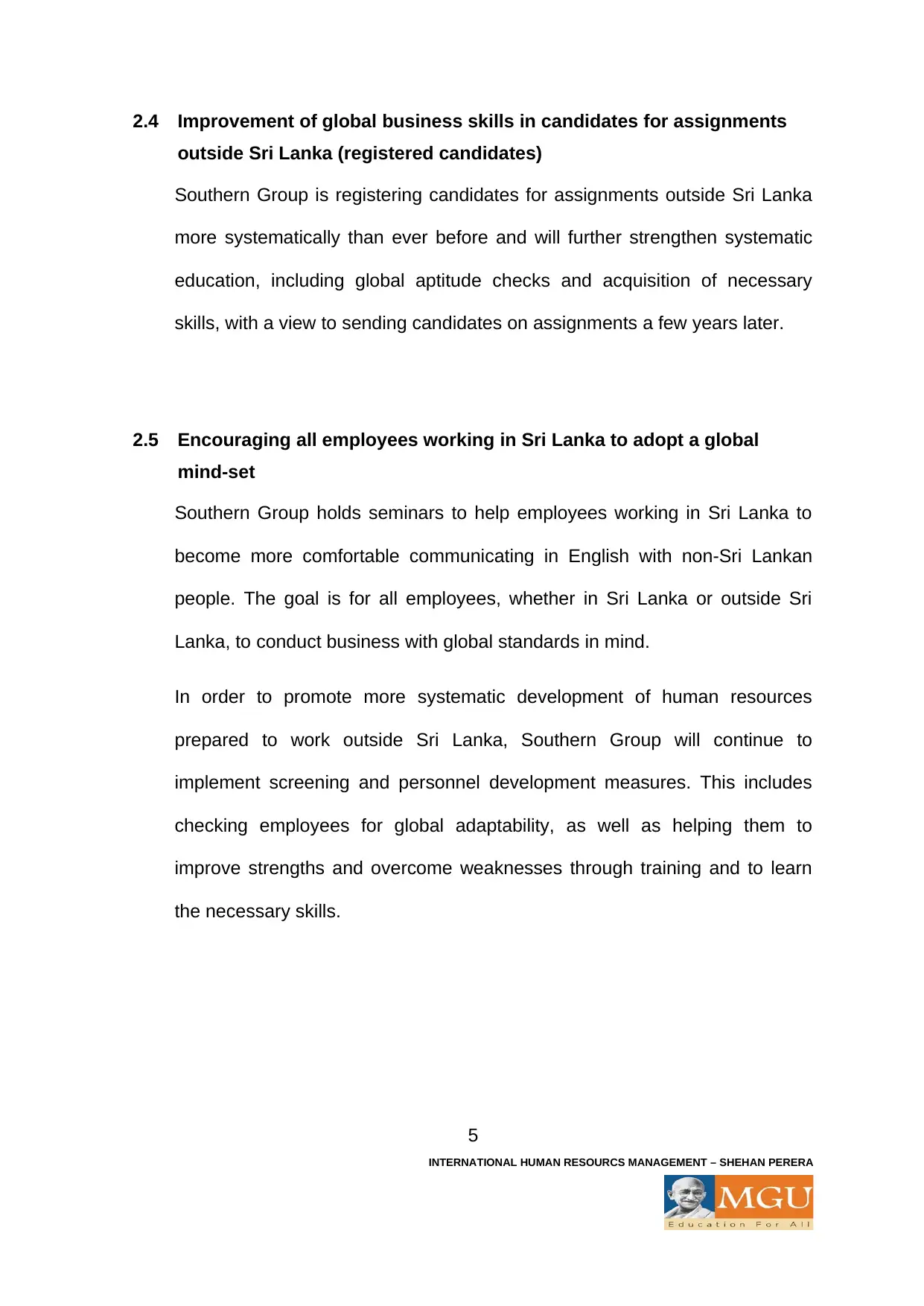
2.4 Improvement of global business skills in candidates for assignments
outside Sri Lanka (registered candidates)
Southern Group is registering candidates for assignments outside Sri Lanka
more systematically than ever before and will further strengthen systematic
education, including global aptitude checks and acquisition of necessary
skills, with a view to sending candidates on assignments a few years later.
2.5 Encouraging all employees working in Sri Lanka to adopt a global
mind-set
Southern Group holds seminars to help employees working in Sri Lanka to
become more comfortable communicating in English with non-Sri Lankan
people. The goal is for all employees, whether in Sri Lanka or outside Sri
Lanka, to conduct business with global standards in mind.
In order to promote more systematic development of human resources
prepared to work outside Sri Lanka, Southern Group will continue to
implement screening and personnel development measures. This includes
checking employees for global adaptability, as well as helping them to
improve strengths and overcome weaknesses through training and to learn
the necessary skills.
5
INTERNATIONAL HUMAN RESOURCS MANAGEMENT – SHEHAN PERERA
outside Sri Lanka (registered candidates)
Southern Group is registering candidates for assignments outside Sri Lanka
more systematically than ever before and will further strengthen systematic
education, including global aptitude checks and acquisition of necessary
skills, with a view to sending candidates on assignments a few years later.
2.5 Encouraging all employees working in Sri Lanka to adopt a global
mind-set
Southern Group holds seminars to help employees working in Sri Lanka to
become more comfortable communicating in English with non-Sri Lankan
people. The goal is for all employees, whether in Sri Lanka or outside Sri
Lanka, to conduct business with global standards in mind.
In order to promote more systematic development of human resources
prepared to work outside Sri Lanka, Southern Group will continue to
implement screening and personnel development measures. This includes
checking employees for global adaptability, as well as helping them to
improve strengths and overcome weaknesses through training and to learn
the necessary skills.
5
INTERNATIONAL HUMAN RESOURCS MANAGEMENT – SHEHAN PERERA
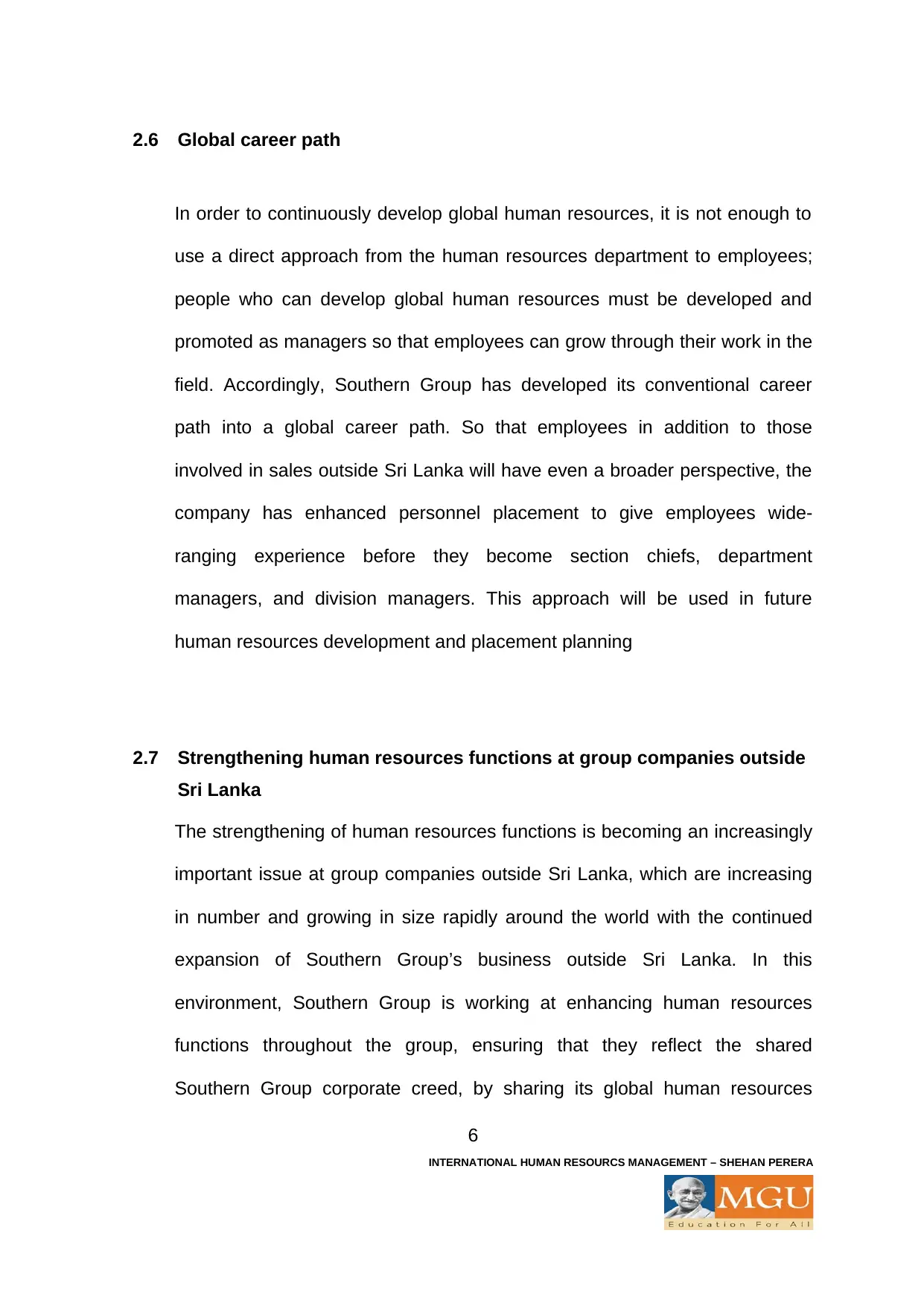
2.6 Global career path
In order to continuously develop global human resources, it is not enough to
use a direct approach from the human resources department to employees;
people who can develop global human resources must be developed and
promoted as managers so that employees can grow through their work in the
field. Accordingly, Southern Group has developed its conventional career
path into a global career path. So that employees in addition to those
involved in sales outside Sri Lanka will have even a broader perspective, the
company has enhanced personnel placement to give employees wide-
ranging experience before they become section chiefs, department
managers, and division managers. This approach will be used in future
human resources development and placement planning
2.7 Strengthening human resources functions at group companies outside
Sri Lanka
The strengthening of human resources functions is becoming an increasingly
important issue at group companies outside Sri Lanka, which are increasing
in number and growing in size rapidly around the world with the continued
expansion of Southern Group’s business outside Sri Lanka. In this
environment, Southern Group is working at enhancing human resources
functions throughout the group, ensuring that they reflect the shared
Southern Group corporate creed, by sharing its global human resources
6
INTERNATIONAL HUMAN RESOURCS MANAGEMENT – SHEHAN PERERA
In order to continuously develop global human resources, it is not enough to
use a direct approach from the human resources department to employees;
people who can develop global human resources must be developed and
promoted as managers so that employees can grow through their work in the
field. Accordingly, Southern Group has developed its conventional career
path into a global career path. So that employees in addition to those
involved in sales outside Sri Lanka will have even a broader perspective, the
company has enhanced personnel placement to give employees wide-
ranging experience before they become section chiefs, department
managers, and division managers. This approach will be used in future
human resources development and placement planning
2.7 Strengthening human resources functions at group companies outside
Sri Lanka
The strengthening of human resources functions is becoming an increasingly
important issue at group companies outside Sri Lanka, which are increasing
in number and growing in size rapidly around the world with the continued
expansion of Southern Group’s business outside Sri Lanka. In this
environment, Southern Group is working at enhancing human resources
functions throughout the group, ensuring that they reflect the shared
Southern Group corporate creed, by sharing its global human resources
6
INTERNATIONAL HUMAN RESOURCS MANAGEMENT – SHEHAN PERERA
Secure Best Marks with AI Grader
Need help grading? Try our AI Grader for instant feedback on your assignments.
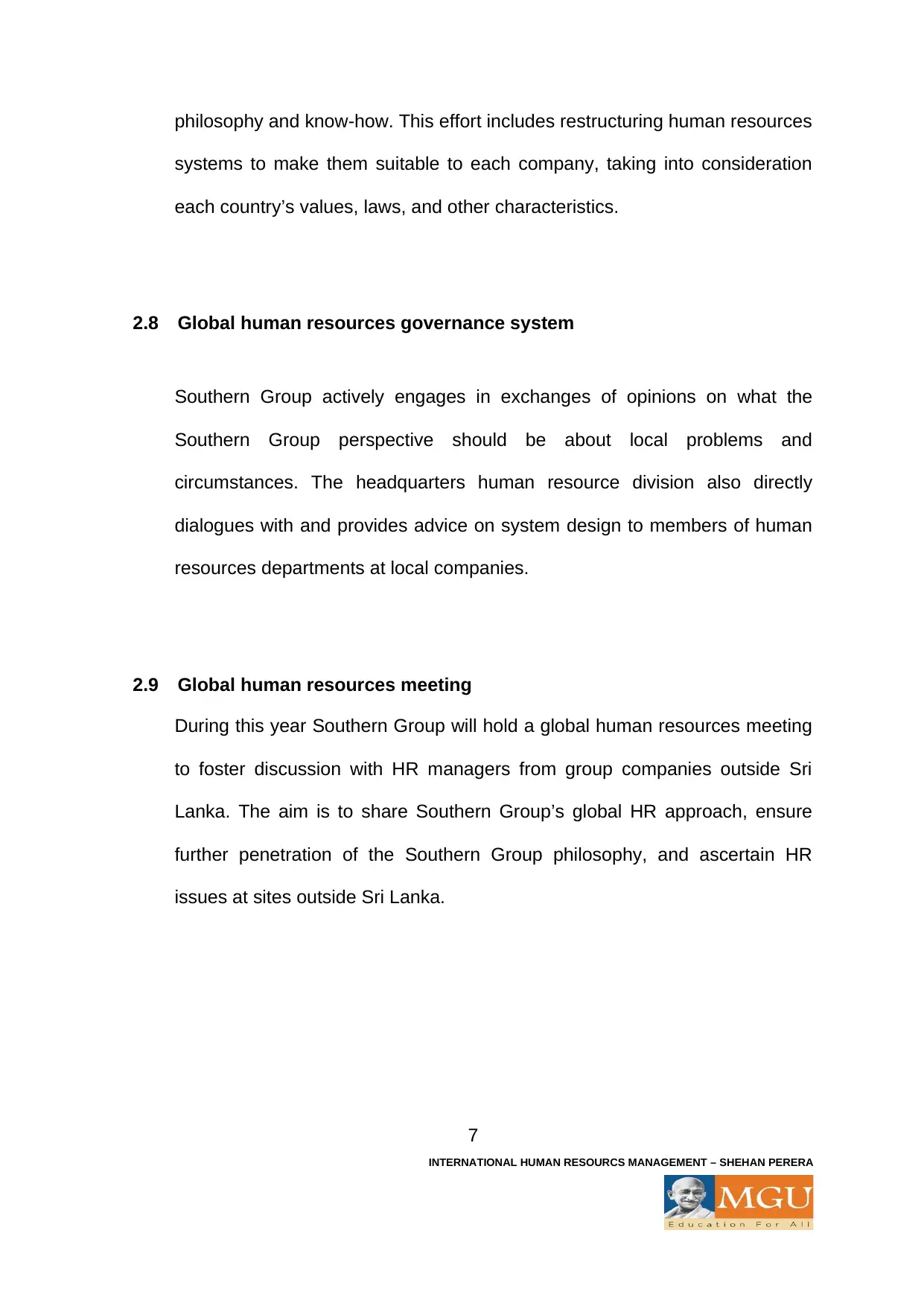
philosophy and know-how. This effort includes restructuring human resources
systems to make them suitable to each company, taking into consideration
each country’s values, laws, and other characteristics.
2.8 Global human resources governance system
Southern Group actively engages in exchanges of opinions on what the
Southern Group perspective should be about local problems and
circumstances. The headquarters human resource division also directly
dialogues with and provides advice on system design to members of human
resources departments at local companies.
2.9 Global human resources meeting
During this year Southern Group will hold a global human resources meeting
to foster discussion with HR managers from group companies outside Sri
Lanka. The aim is to share Southern Group’s global HR approach, ensure
further penetration of the Southern Group philosophy, and ascertain HR
issues at sites outside Sri Lanka.
7
INTERNATIONAL HUMAN RESOURCS MANAGEMENT – SHEHAN PERERA
systems to make them suitable to each company, taking into consideration
each country’s values, laws, and other characteristics.
2.8 Global human resources governance system
Southern Group actively engages in exchanges of opinions on what the
Southern Group perspective should be about local problems and
circumstances. The headquarters human resource division also directly
dialogues with and provides advice on system design to members of human
resources departments at local companies.
2.9 Global human resources meeting
During this year Southern Group will hold a global human resources meeting
to foster discussion with HR managers from group companies outside Sri
Lanka. The aim is to share Southern Group’s global HR approach, ensure
further penetration of the Southern Group philosophy, and ascertain HR
issues at sites outside Sri Lanka.
7
INTERNATIONAL HUMAN RESOURCS MANAGEMENT – SHEHAN PERERA

8
INTERNATIONAL HUMAN RESOURCS MANAGEMENT – SHEHAN PERERA
INTERNATIONAL HUMAN RESOURCS MANAGEMENT – SHEHAN PERERA
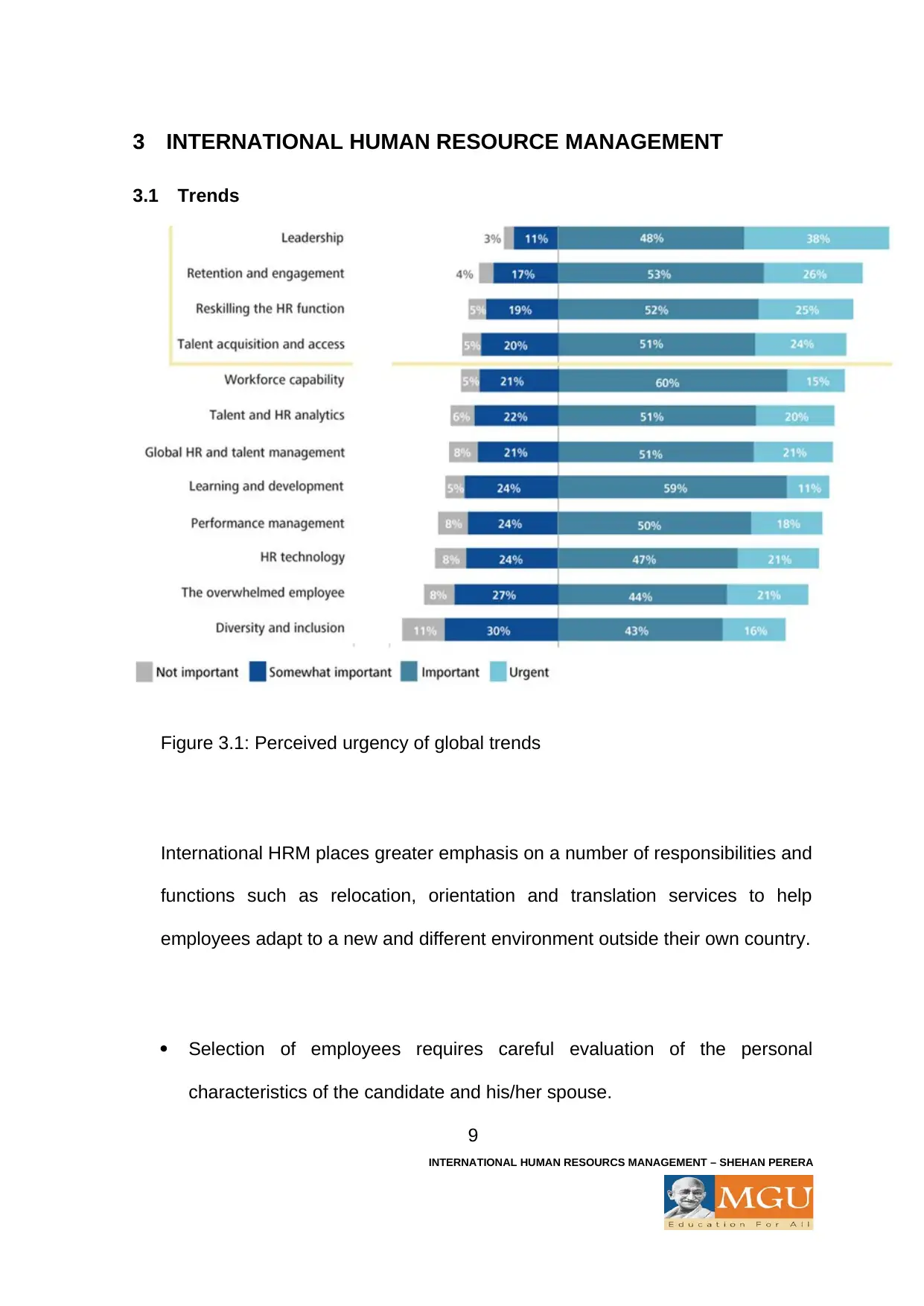
3 INTERNATIONAL HUMAN RESOURCE MANAGEMENT
3.1 Trends
Figure 3.1: Perceived urgency of global trends
International HRM places greater emphasis on a number of responsibilities and
functions such as relocation, orientation and translation services to help
employees adapt to a new and different environment outside their own country.
Selection of employees requires careful evaluation of the personal
characteristics of the candidate and his/her spouse.
9
INTERNATIONAL HUMAN RESOURCS MANAGEMENT – SHEHAN PERERA
3.1 Trends
Figure 3.1: Perceived urgency of global trends
International HRM places greater emphasis on a number of responsibilities and
functions such as relocation, orientation and translation services to help
employees adapt to a new and different environment outside their own country.
Selection of employees requires careful evaluation of the personal
characteristics of the candidate and his/her spouse.
9
INTERNATIONAL HUMAN RESOURCS MANAGEMENT – SHEHAN PERERA
Paraphrase This Document
Need a fresh take? Get an instant paraphrase of this document with our AI Paraphraser
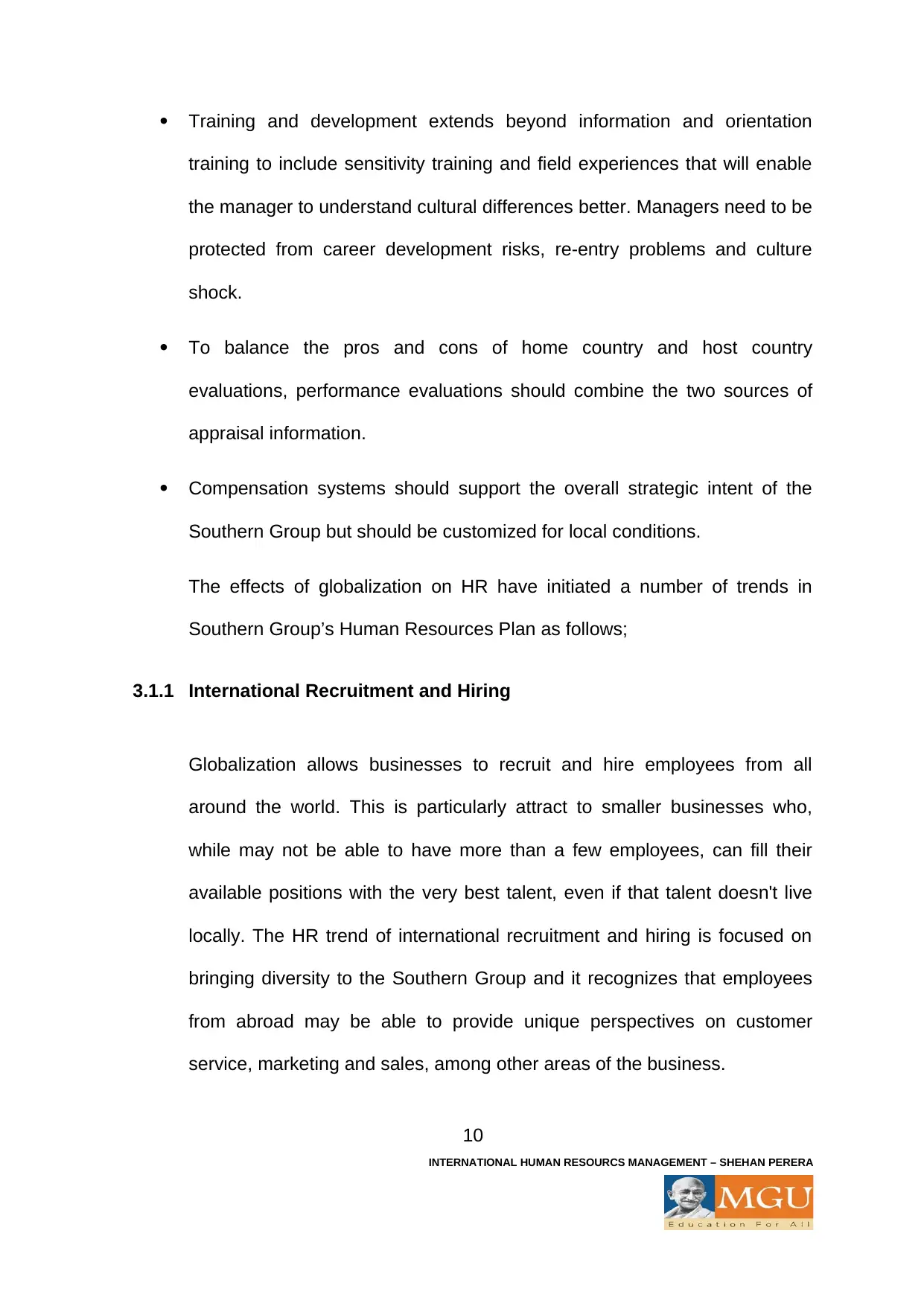
Training and development extends beyond information and orientation
training to include sensitivity training and field experiences that will enable
the manager to understand cultural differences better. Managers need to be
protected from career development risks, re-entry problems and culture
shock.
To balance the pros and cons of home country and host country
evaluations, performance evaluations should combine the two sources of
appraisal information.
Compensation systems should support the overall strategic intent of the
Southern Group but should be customized for local conditions.
The effects of globalization on HR have initiated a number of trends in
Southern Group’s Human Resources Plan as follows;
3.1.1 International Recruitment and Hiring
Globalization allows businesses to recruit and hire employees from all
around the world. This is particularly attract to smaller businesses who,
while may not be able to have more than a few employees, can fill their
available positions with the very best talent, even if that talent doesn't live
locally. The HR trend of international recruitment and hiring is focused on
bringing diversity to the Southern Group and it recognizes that employees
from abroad may be able to provide unique perspectives on customer
service, marketing and sales, among other areas of the business.
10
INTERNATIONAL HUMAN RESOURCS MANAGEMENT – SHEHAN PERERA
training to include sensitivity training and field experiences that will enable
the manager to understand cultural differences better. Managers need to be
protected from career development risks, re-entry problems and culture
shock.
To balance the pros and cons of home country and host country
evaluations, performance evaluations should combine the two sources of
appraisal information.
Compensation systems should support the overall strategic intent of the
Southern Group but should be customized for local conditions.
The effects of globalization on HR have initiated a number of trends in
Southern Group’s Human Resources Plan as follows;
3.1.1 International Recruitment and Hiring
Globalization allows businesses to recruit and hire employees from all
around the world. This is particularly attract to smaller businesses who,
while may not be able to have more than a few employees, can fill their
available positions with the very best talent, even if that talent doesn't live
locally. The HR trend of international recruitment and hiring is focused on
bringing diversity to the Southern Group and it recognizes that employees
from abroad may be able to provide unique perspectives on customer
service, marketing and sales, among other areas of the business.
10
INTERNATIONAL HUMAN RESOURCS MANAGEMENT – SHEHAN PERERA
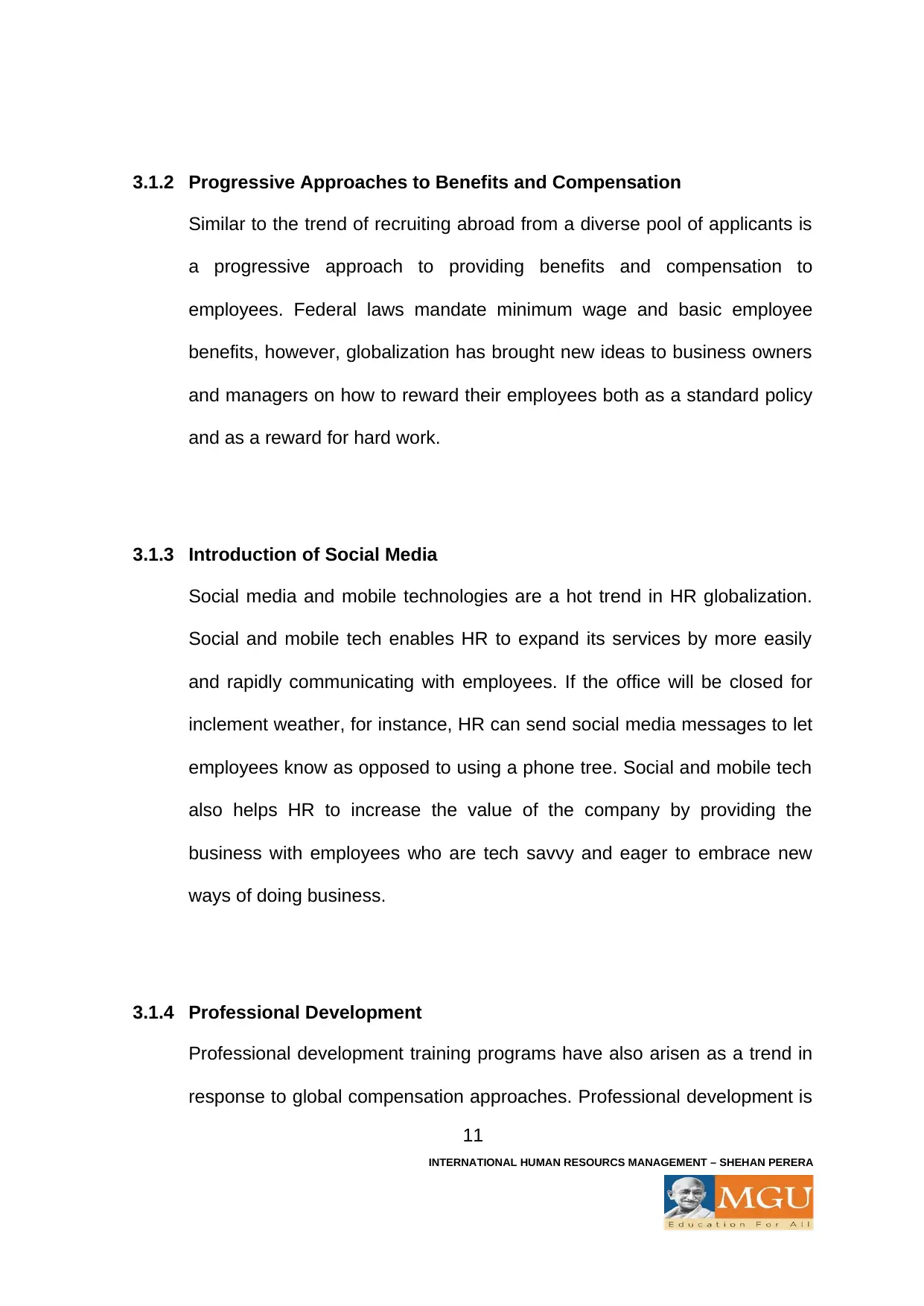
3.1.2 Progressive Approaches to Benefits and Compensation
Similar to the trend of recruiting abroad from a diverse pool of applicants is
a progressive approach to providing benefits and compensation to
employees. Federal laws mandate minimum wage and basic employee
benefits, however, globalization has brought new ideas to business owners
and managers on how to reward their employees both as a standard policy
and as a reward for hard work.
3.1.3 Introduction of Social Media
Social media and mobile technologies are a hot trend in HR globalization.
Social and mobile tech enables HR to expand its services by more easily
and rapidly communicating with employees. If the office will be closed for
inclement weather, for instance, HR can send social media messages to let
employees know as opposed to using a phone tree. Social and mobile tech
also helps HR to increase the value of the company by providing the
business with employees who are tech savvy and eager to embrace new
ways of doing business.
3.1.4 Professional Development
Professional development training programs have also arisen as a trend in
response to global compensation approaches. Professional development is
11
INTERNATIONAL HUMAN RESOURCS MANAGEMENT – SHEHAN PERERA
Similar to the trend of recruiting abroad from a diverse pool of applicants is
a progressive approach to providing benefits and compensation to
employees. Federal laws mandate minimum wage and basic employee
benefits, however, globalization has brought new ideas to business owners
and managers on how to reward their employees both as a standard policy
and as a reward for hard work.
3.1.3 Introduction of Social Media
Social media and mobile technologies are a hot trend in HR globalization.
Social and mobile tech enables HR to expand its services by more easily
and rapidly communicating with employees. If the office will be closed for
inclement weather, for instance, HR can send social media messages to let
employees know as opposed to using a phone tree. Social and mobile tech
also helps HR to increase the value of the company by providing the
business with employees who are tech savvy and eager to embrace new
ways of doing business.
3.1.4 Professional Development
Professional development training programs have also arisen as a trend in
response to global compensation approaches. Professional development is
11
INTERNATIONAL HUMAN RESOURCS MANAGEMENT – SHEHAN PERERA
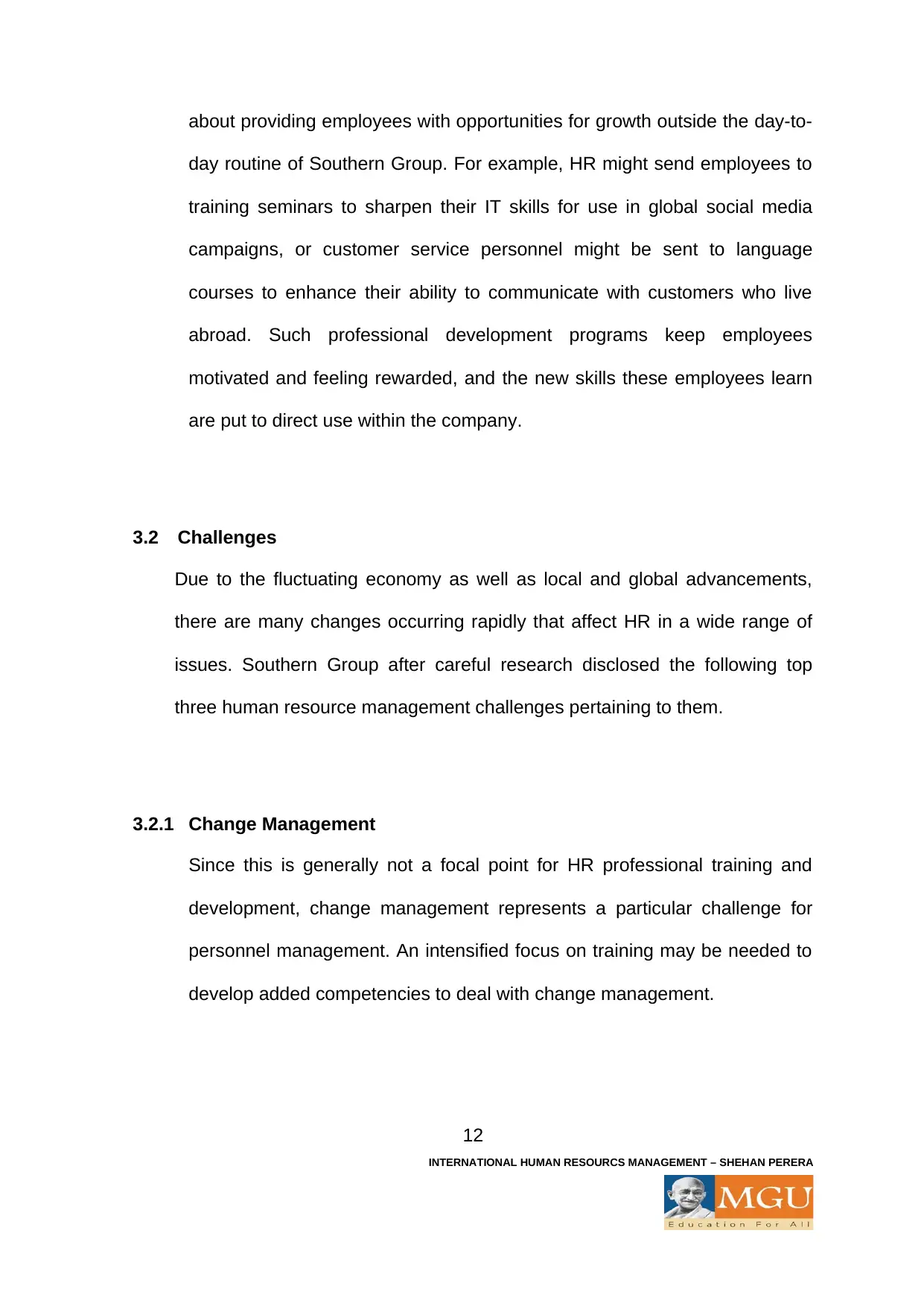
about providing employees with opportunities for growth outside the day-to-
day routine of Southern Group. For example, HR might send employees to
training seminars to sharpen their IT skills for use in global social media
campaigns, or customer service personnel might be sent to language
courses to enhance their ability to communicate with customers who live
abroad. Such professional development programs keep employees
motivated and feeling rewarded, and the new skills these employees learn
are put to direct use within the company.
3.2 Challenges
Due to the fluctuating economy as well as local and global advancements,
there are many changes occurring rapidly that affect HR in a wide range of
issues. Southern Group after careful research disclosed the following top
three human resource management challenges pertaining to them.
3.2.1 Change Management
Since this is generally not a focal point for HR professional training and
development, change management represents a particular challenge for
personnel management. An intensified focus on training may be needed to
develop added competencies to deal with change management.
12
INTERNATIONAL HUMAN RESOURCS MANAGEMENT – SHEHAN PERERA
day routine of Southern Group. For example, HR might send employees to
training seminars to sharpen their IT skills for use in global social media
campaigns, or customer service personnel might be sent to language
courses to enhance their ability to communicate with customers who live
abroad. Such professional development programs keep employees
motivated and feeling rewarded, and the new skills these employees learn
are put to direct use within the company.
3.2 Challenges
Due to the fluctuating economy as well as local and global advancements,
there are many changes occurring rapidly that affect HR in a wide range of
issues. Southern Group after careful research disclosed the following top
three human resource management challenges pertaining to them.
3.2.1 Change Management
Since this is generally not a focal point for HR professional training and
development, change management represents a particular challenge for
personnel management. An intensified focus on training may be needed to
develop added competencies to deal with change management.
12
INTERNATIONAL HUMAN RESOURCS MANAGEMENT – SHEHAN PERERA
Secure Best Marks with AI Grader
Need help grading? Try our AI Grader for instant feedback on your assignments.
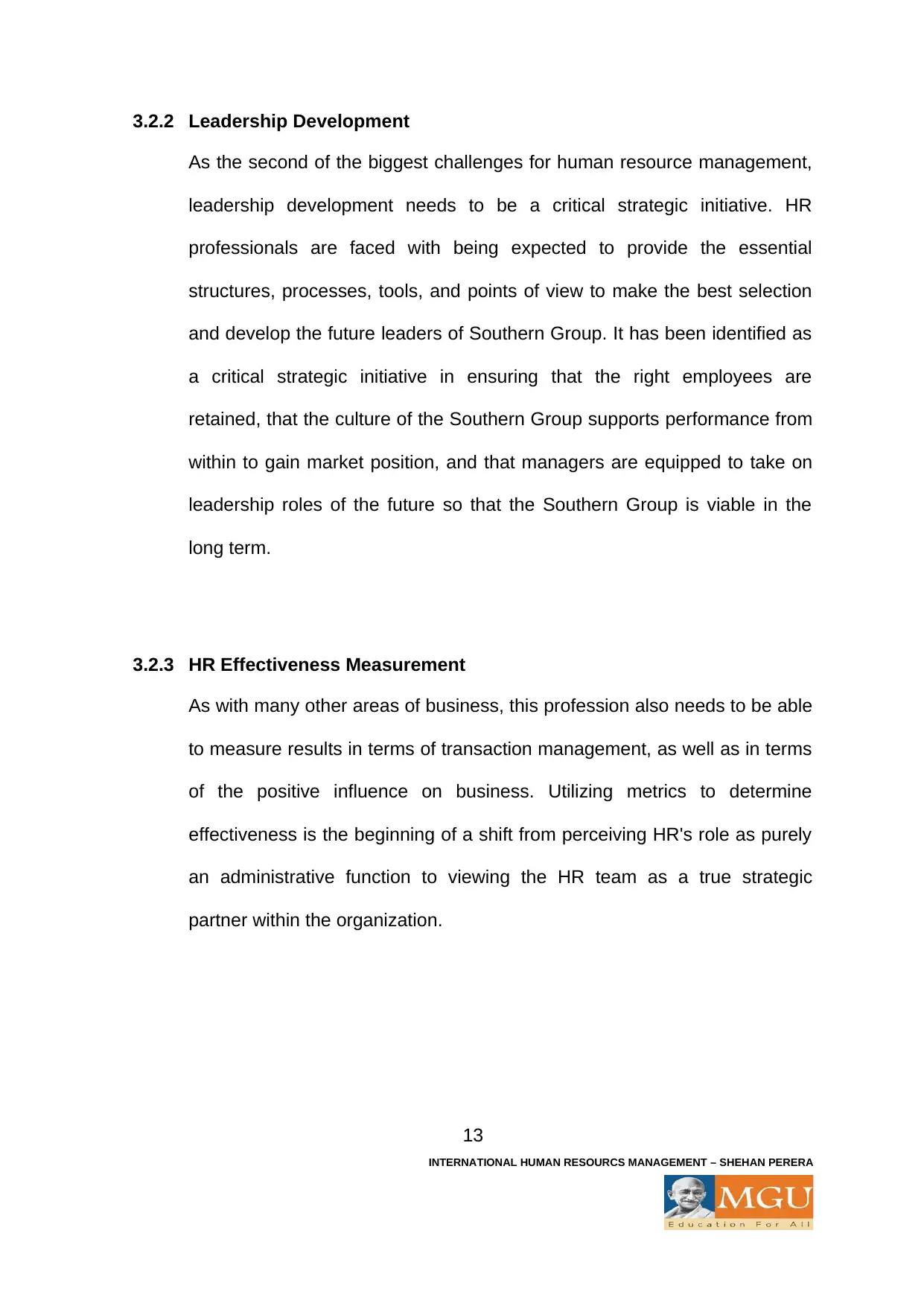
3.2.2 Leadership Development
As the second of the biggest challenges for human resource management,
leadership development needs to be a critical strategic initiative. HR
professionals are faced with being expected to provide the essential
structures, processes, tools, and points of view to make the best selection
and develop the future leaders of Southern Group. It has been identified as
a critical strategic initiative in ensuring that the right employees are
retained, that the culture of the Southern Group supports performance from
within to gain market position, and that managers are equipped to take on
leadership roles of the future so that the Southern Group is viable in the
long term.
3.2.3 HR Effectiveness Measurement
As with many other areas of business, this profession also needs to be able
to measure results in terms of transaction management, as well as in terms
of the positive influence on business. Utilizing metrics to determine
effectiveness is the beginning of a shift from perceiving HR's role as purely
an administrative function to viewing the HR team as a true strategic
partner within the organization.
13
INTERNATIONAL HUMAN RESOURCS MANAGEMENT – SHEHAN PERERA
As the second of the biggest challenges for human resource management,
leadership development needs to be a critical strategic initiative. HR
professionals are faced with being expected to provide the essential
structures, processes, tools, and points of view to make the best selection
and develop the future leaders of Southern Group. It has been identified as
a critical strategic initiative in ensuring that the right employees are
retained, that the culture of the Southern Group supports performance from
within to gain market position, and that managers are equipped to take on
leadership roles of the future so that the Southern Group is viable in the
long term.
3.2.3 HR Effectiveness Measurement
As with many other areas of business, this profession also needs to be able
to measure results in terms of transaction management, as well as in terms
of the positive influence on business. Utilizing metrics to determine
effectiveness is the beginning of a shift from perceiving HR's role as purely
an administrative function to viewing the HR team as a true strategic
partner within the organization.
13
INTERNATIONAL HUMAN RESOURCS MANAGEMENT – SHEHAN PERERA
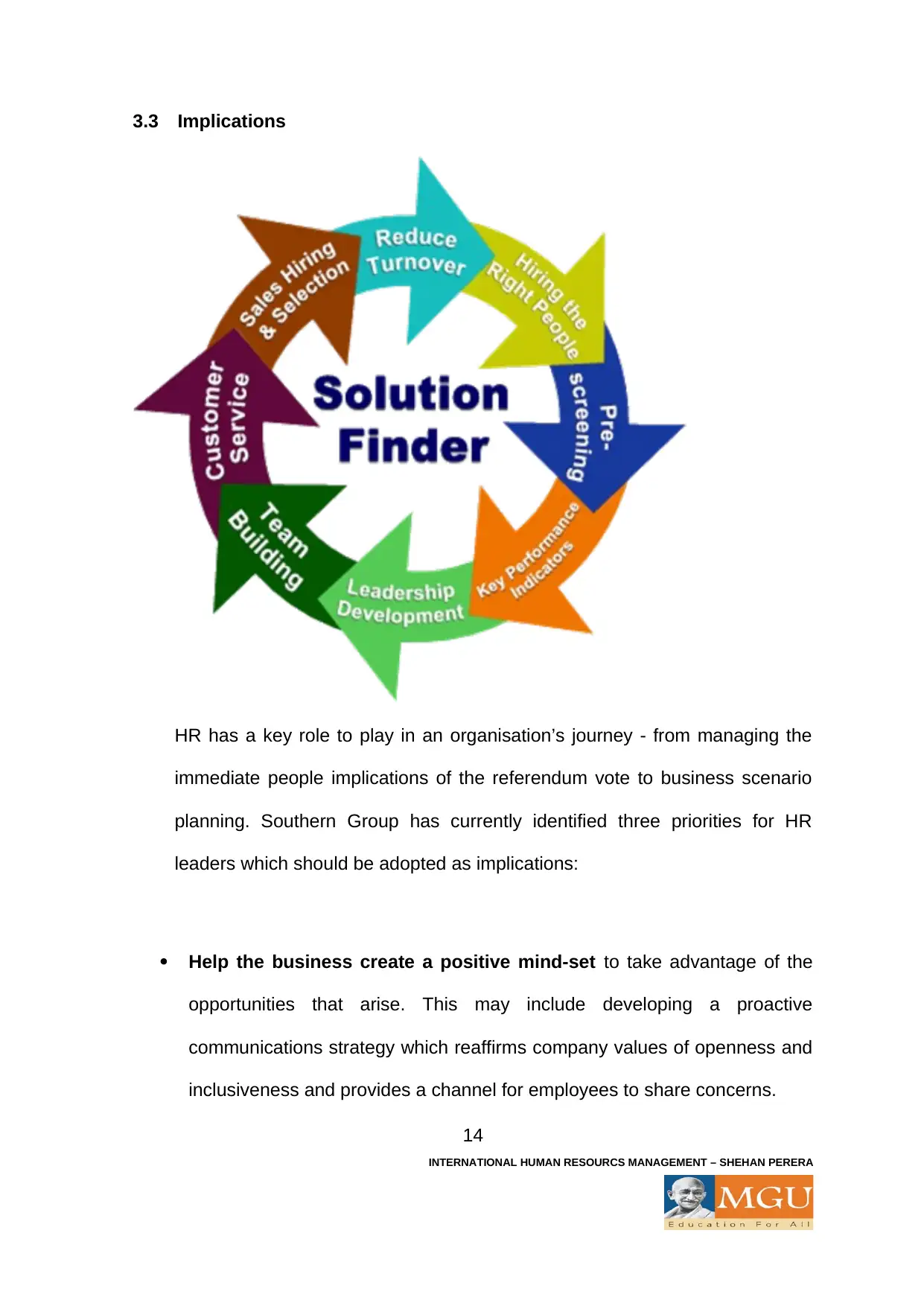
3.3 Implications
HR has a key role to play in an organisation’s journey - from managing the
immediate people implications of the referendum vote to business scenario
planning. Southern Group has currently identified three priorities for HR
leaders which should be adopted as implications:
Help the business create a positive mind-set to take advantage of the
opportunities that arise. This may include developing a proactive
communications strategy which reaffirms company values of openness and
inclusiveness and provides a channel for employees to share concerns.
14
INTERNATIONAL HUMAN RESOURCS MANAGEMENT – SHEHAN PERERA
HR has a key role to play in an organisation’s journey - from managing the
immediate people implications of the referendum vote to business scenario
planning. Southern Group has currently identified three priorities for HR
leaders which should be adopted as implications:
Help the business create a positive mind-set to take advantage of the
opportunities that arise. This may include developing a proactive
communications strategy which reaffirms company values of openness and
inclusiveness and provides a channel for employees to share concerns.
14
INTERNATIONAL HUMAN RESOURCS MANAGEMENT – SHEHAN PERERA
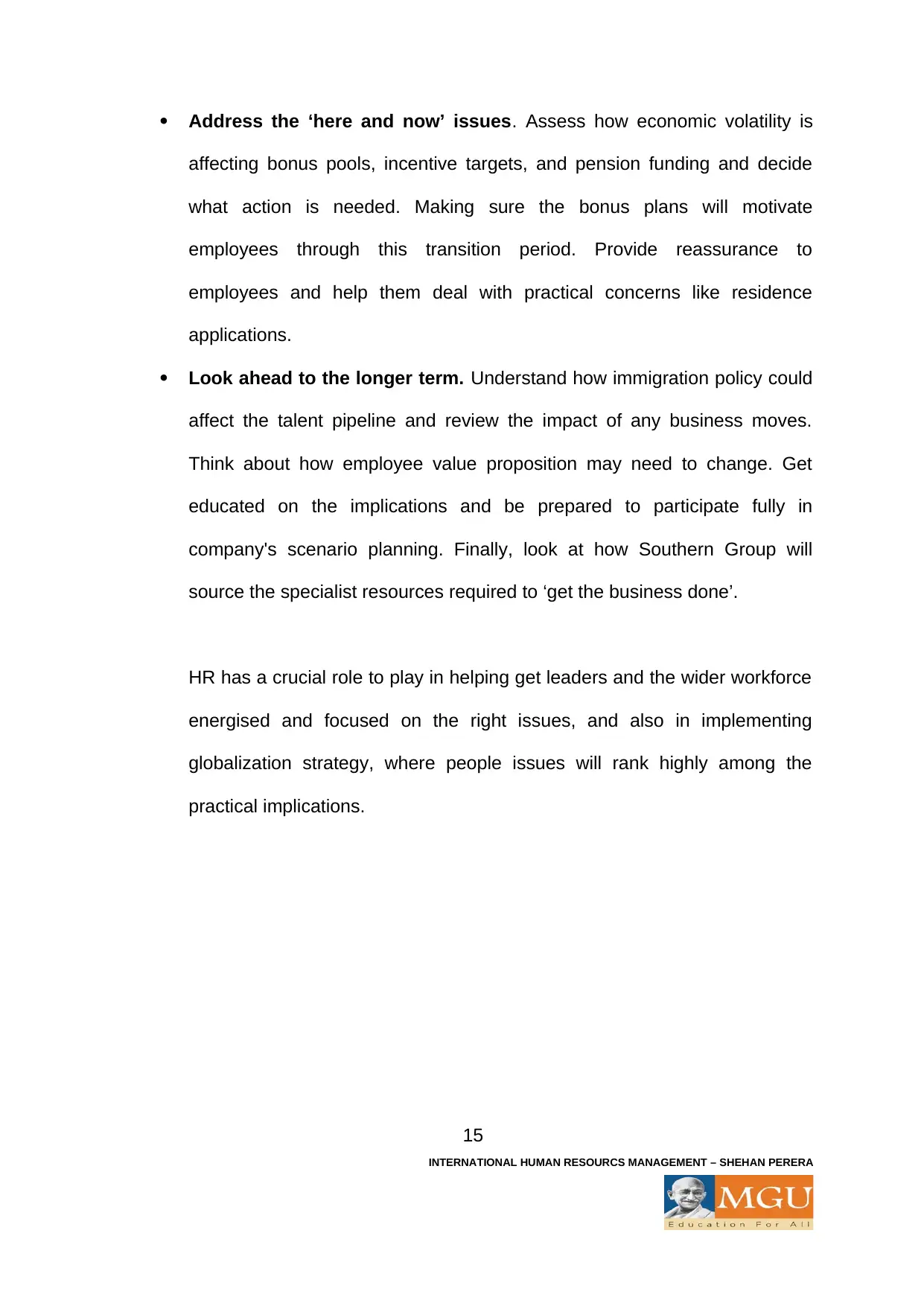
Address the ‘here and now’ issues. Assess how economic volatility is
affecting bonus pools, incentive targets, and pension funding and decide
what action is needed. Making sure the bonus plans will motivate
employees through this transition period. Provide reassurance to
employees and help them deal with practical concerns like residence
applications.
Look ahead to the longer term. Understand how immigration policy could
affect the talent pipeline and review the impact of any business moves.
Think about how employee value proposition may need to change. Get
educated on the implications and be prepared to participate fully in
company's scenario planning. Finally, look at how Southern Group will
source the specialist resources required to ‘get the business done’.
HR has a crucial role to play in helping get leaders and the wider workforce
energised and focused on the right issues, and also in implementing
globalization strategy, where people issues will rank highly among the
practical implications.
15
INTERNATIONAL HUMAN RESOURCS MANAGEMENT – SHEHAN PERERA
affecting bonus pools, incentive targets, and pension funding and decide
what action is needed. Making sure the bonus plans will motivate
employees through this transition period. Provide reassurance to
employees and help them deal with practical concerns like residence
applications.
Look ahead to the longer term. Understand how immigration policy could
affect the talent pipeline and review the impact of any business moves.
Think about how employee value proposition may need to change. Get
educated on the implications and be prepared to participate fully in
company's scenario planning. Finally, look at how Southern Group will
source the specialist resources required to ‘get the business done’.
HR has a crucial role to play in helping get leaders and the wider workforce
energised and focused on the right issues, and also in implementing
globalization strategy, where people issues will rank highly among the
practical implications.
15
INTERNATIONAL HUMAN RESOURCS MANAGEMENT – SHEHAN PERERA
Paraphrase This Document
Need a fresh take? Get an instant paraphrase of this document with our AI Paraphraser
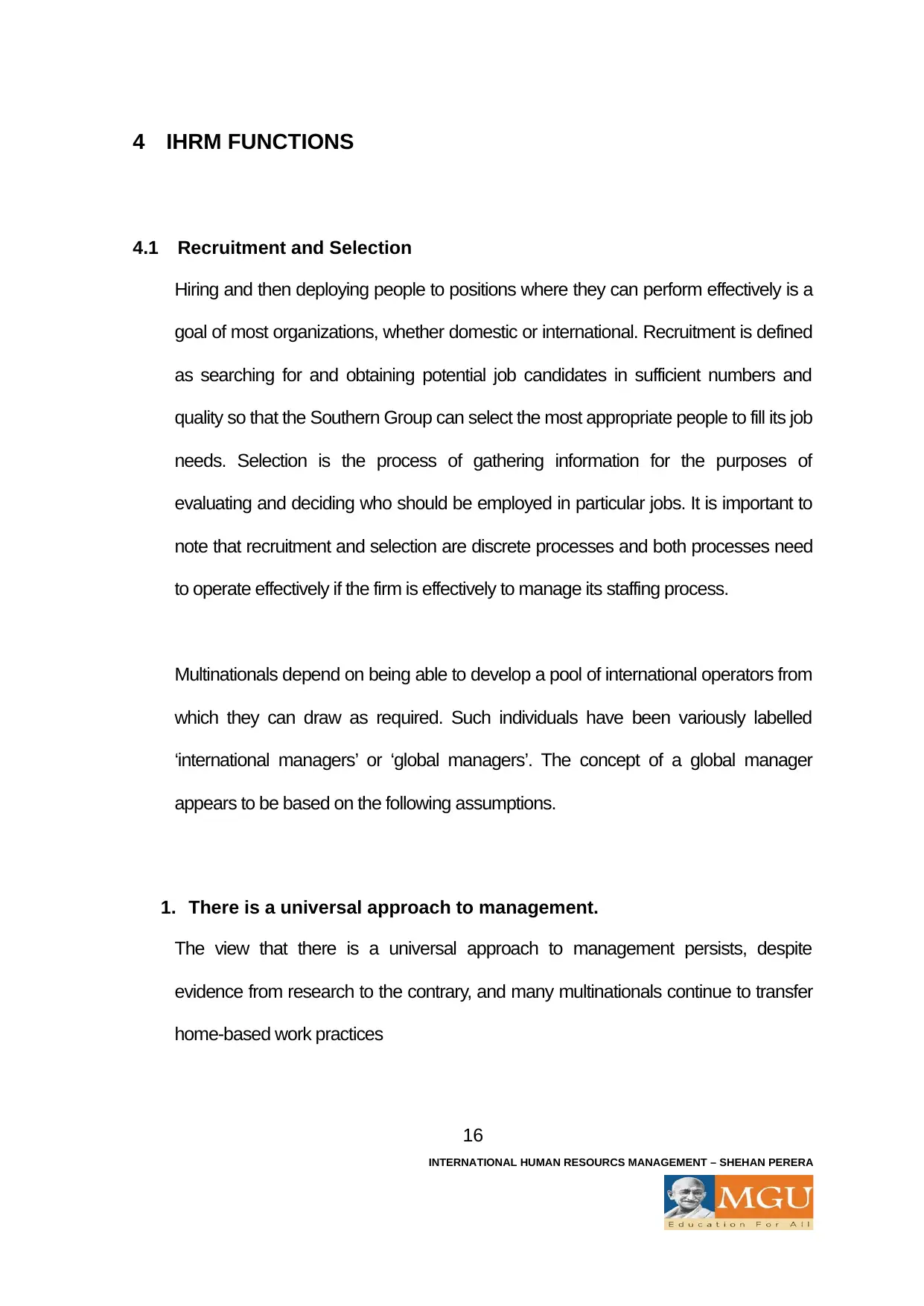
4 IHRM FUNCTIONS
4.1 Recruitment and Selection
Hiring and then deploying people to positions where they can perform effectively is a
goal of most organizations, whether domestic or international. Recruitment is defined
as searching for and obtaining potential job candidates in sufficient numbers and
quality so that the Southern Group can select the most appropriate people to fill its job
needs. Selection is the process of gathering information for the purposes of
evaluating and deciding who should be employed in particular jobs. It is important to
note that recruitment and selection are discrete processes and both processes need
to operate effectively if the firm is effectively to manage its staffing process.
Multinationals depend on being able to develop a pool of international operators from
which they can draw as required. Such individuals have been variously labelled
‘international managers’ or ‘global managers’. The concept of a global manager
appears to be based on the following assumptions.
1. There is a universal approach to management.
The view that there is a universal approach to management persists, despite
evidence from research to the contrary, and many multinationals continue to transfer
home-based work practices
16
INTERNATIONAL HUMAN RESOURCS MANAGEMENT – SHEHAN PERERA
4.1 Recruitment and Selection
Hiring and then deploying people to positions where they can perform effectively is a
goal of most organizations, whether domestic or international. Recruitment is defined
as searching for and obtaining potential job candidates in sufficient numbers and
quality so that the Southern Group can select the most appropriate people to fill its job
needs. Selection is the process of gathering information for the purposes of
evaluating and deciding who should be employed in particular jobs. It is important to
note that recruitment and selection are discrete processes and both processes need
to operate effectively if the firm is effectively to manage its staffing process.
Multinationals depend on being able to develop a pool of international operators from
which they can draw as required. Such individuals have been variously labelled
‘international managers’ or ‘global managers’. The concept of a global manager
appears to be based on the following assumptions.
1. There is a universal approach to management.
The view that there is a universal approach to management persists, despite
evidence from research to the contrary, and many multinationals continue to transfer
home-based work practices
16
INTERNATIONAL HUMAN RESOURCS MANAGEMENT – SHEHAN PERERA
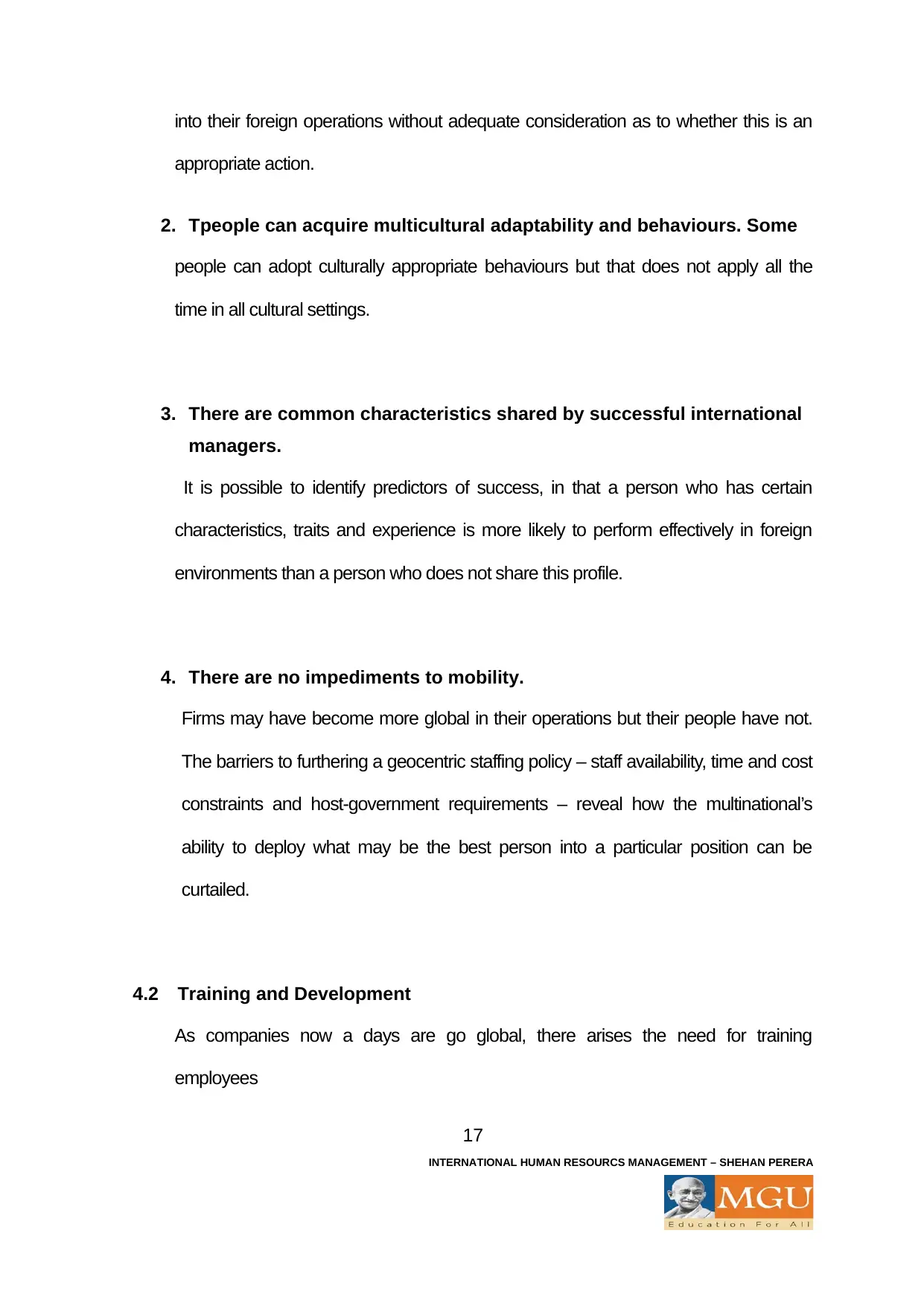
into their foreign operations without adequate consideration as to whether this is an
appropriate action.
2. Tpeople can acquire multicultural adaptability and behaviours. Some
people can adopt culturally appropriate behaviours but that does not apply all the
time in all cultural settings.
3. There are common characteristics shared by successful international
managers.
It is possible to identify predictors of success, in that a person who has certain
characteristics, traits and experience is more likely to perform effectively in foreign
environments than a person who does not share this profile.
4. There are no impediments to mobility.
Firms may have become more global in their operations but their people have not.
The barriers to furthering a geocentric staffing policy – staff availability, time and cost
constraints and host-government requirements – reveal how the multinational’s
ability to deploy what may be the best person into a particular position can be
curtailed.
4.2 Training and Development
As companies now a days are go global, there arises the need for training
employees
17
INTERNATIONAL HUMAN RESOURCS MANAGEMENT – SHEHAN PERERA
appropriate action.
2. Tpeople can acquire multicultural adaptability and behaviours. Some
people can adopt culturally appropriate behaviours but that does not apply all the
time in all cultural settings.
3. There are common characteristics shared by successful international
managers.
It is possible to identify predictors of success, in that a person who has certain
characteristics, traits and experience is more likely to perform effectively in foreign
environments than a person who does not share this profile.
4. There are no impediments to mobility.
Firms may have become more global in their operations but their people have not.
The barriers to furthering a geocentric staffing policy – staff availability, time and cost
constraints and host-government requirements – reveal how the multinational’s
ability to deploy what may be the best person into a particular position can be
curtailed.
4.2 Training and Development
As companies now a days are go global, there arises the need for training
employees
17
INTERNATIONAL HUMAN RESOURCS MANAGEMENT – SHEHAN PERERA
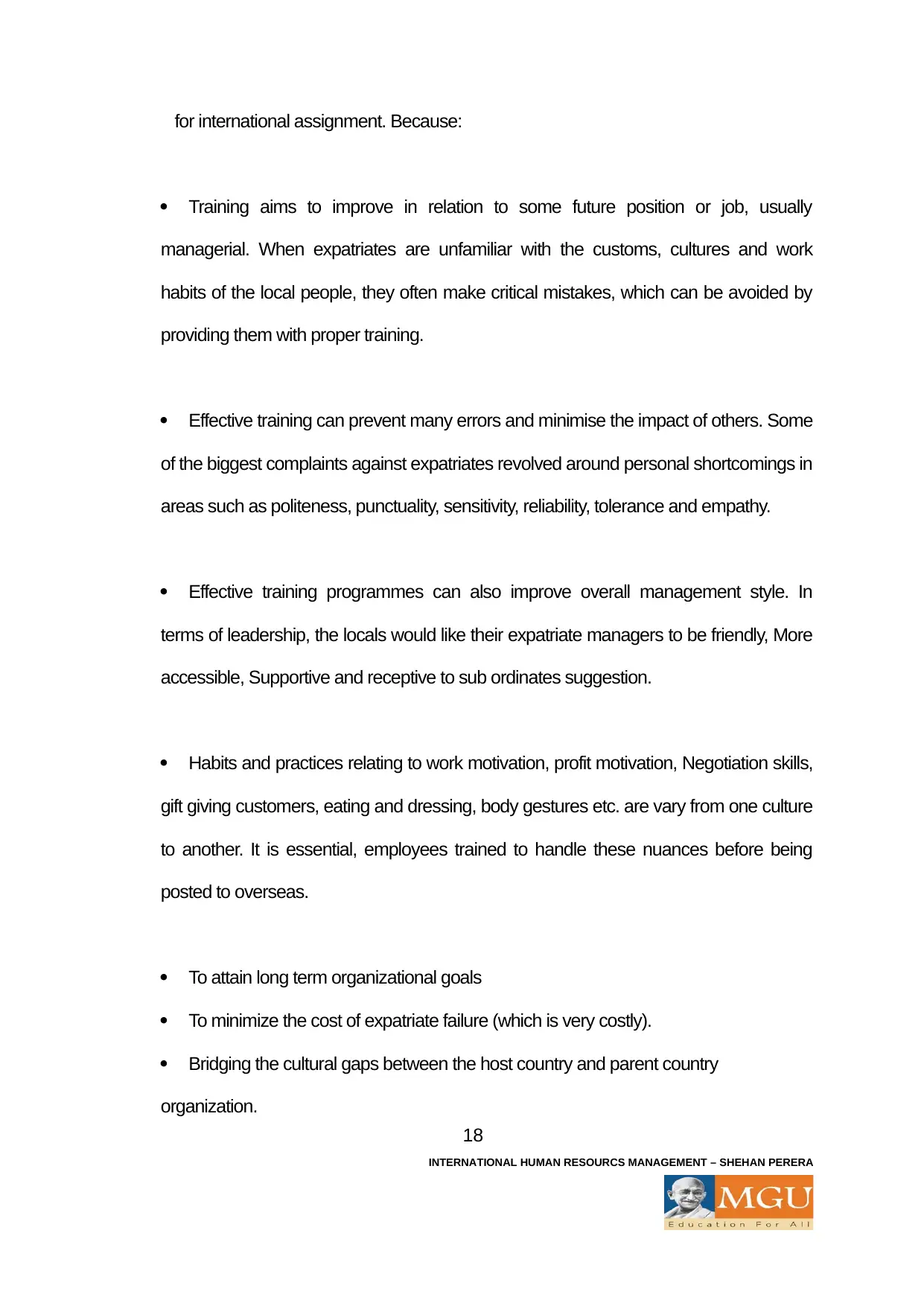
for international assignment. Because:
Training aims to improve in relation to some future position or job, usually
managerial. When expatriates are unfamiliar with the customs, cultures and work
habits of the local people, they often make critical mistakes, which can be avoided by
providing them with proper training.
Effective training can prevent many errors and minimise the impact of others. Some
of the biggest complaints against expatriates revolved around personal shortcomings in
areas such as politeness, punctuality, sensitivity, reliability, tolerance and empathy.
Effective training programmes can also improve overall management style. In
terms of leadership, the locals would like their expatriate managers to be friendly, More
accessible, Supportive and receptive to sub ordinates suggestion.
Habits and practices relating to work motivation, profit motivation, Negotiation skills,
gift giving customers, eating and dressing, body gestures etc. are vary from one culture
to another. It is essential, employees trained to handle these nuances before being
posted to overseas.
To attain long term organizational goals
To minimize the cost of expatriate failure (which is very costly).
Bridging the cultural gaps between the host country and parent country
organization.
18
INTERNATIONAL HUMAN RESOURCS MANAGEMENT – SHEHAN PERERA
Training aims to improve in relation to some future position or job, usually
managerial. When expatriates are unfamiliar with the customs, cultures and work
habits of the local people, they often make critical mistakes, which can be avoided by
providing them with proper training.
Effective training can prevent many errors and minimise the impact of others. Some
of the biggest complaints against expatriates revolved around personal shortcomings in
areas such as politeness, punctuality, sensitivity, reliability, tolerance and empathy.
Effective training programmes can also improve overall management style. In
terms of leadership, the locals would like their expatriate managers to be friendly, More
accessible, Supportive and receptive to sub ordinates suggestion.
Habits and practices relating to work motivation, profit motivation, Negotiation skills,
gift giving customers, eating and dressing, body gestures etc. are vary from one culture
to another. It is essential, employees trained to handle these nuances before being
posted to overseas.
To attain long term organizational goals
To minimize the cost of expatriate failure (which is very costly).
Bridging the cultural gaps between the host country and parent country
organization.
18
INTERNATIONAL HUMAN RESOURCS MANAGEMENT – SHEHAN PERERA
Secure Best Marks with AI Grader
Need help grading? Try our AI Grader for instant feedback on your assignments.
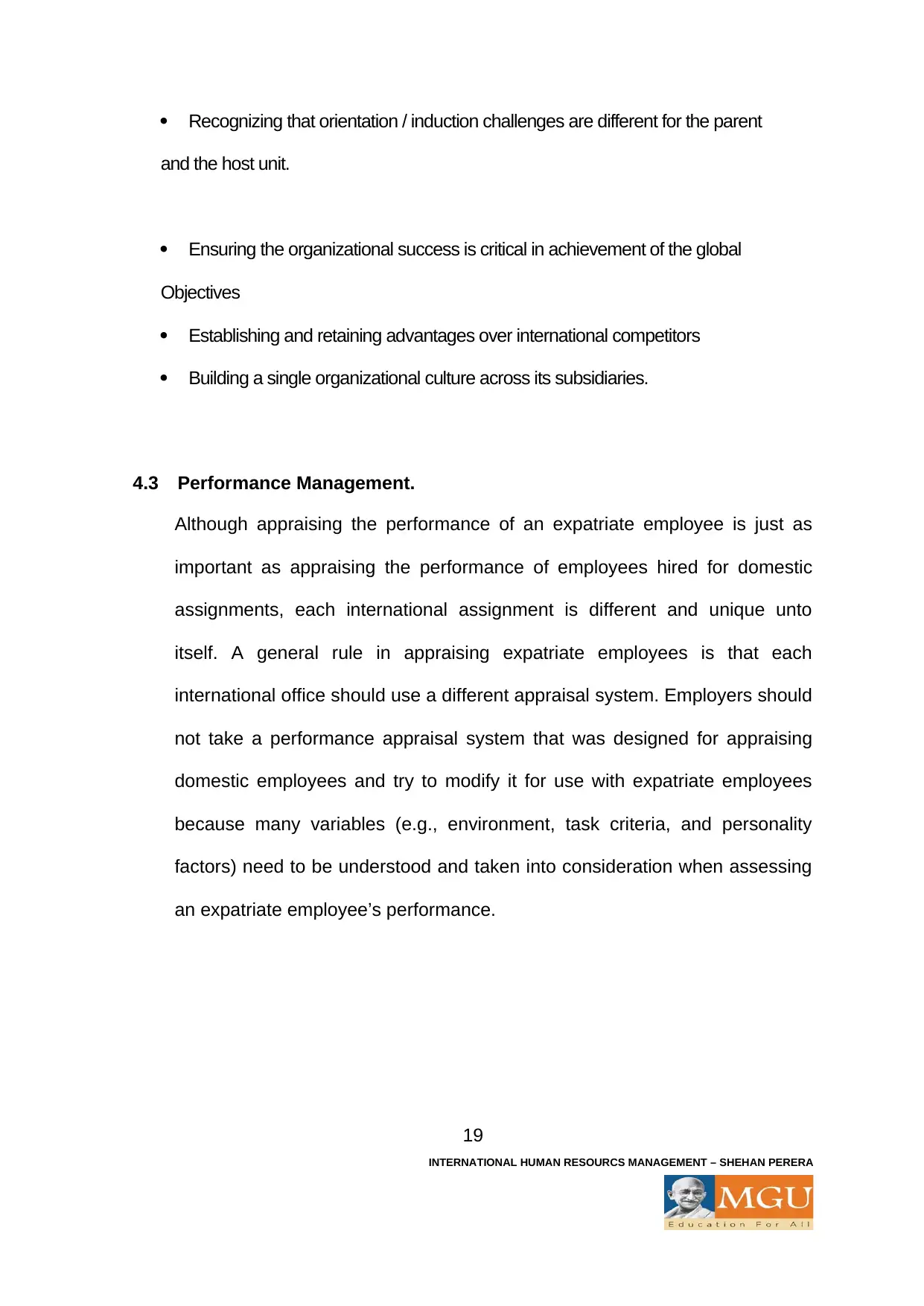
Recognizing that orientation / induction challenges are different for the parent
and the host unit.
Ensuring the organizational success is critical in achievement of the global
Objectives
Establishing and retaining advantages over international competitors
Building a single organizational culture across its subsidiaries.
4.3 Performance Management.
Although appraising the performance of an expatriate employee is just as
important as appraising the performance of employees hired for domestic
assignments, each international assignment is different and unique unto
itself. A general rule in appraising expatriate employees is that each
international office should use a different appraisal system. Employers should
not take a performance appraisal system that was designed for appraising
domestic employees and try to modify it for use with expatriate employees
because many variables (e.g., environment, task criteria, and personality
factors) need to be understood and taken into consideration when assessing
an expatriate employee’s performance.
19
INTERNATIONAL HUMAN RESOURCS MANAGEMENT – SHEHAN PERERA
and the host unit.
Ensuring the organizational success is critical in achievement of the global
Objectives
Establishing and retaining advantages over international competitors
Building a single organizational culture across its subsidiaries.
4.3 Performance Management.
Although appraising the performance of an expatriate employee is just as
important as appraising the performance of employees hired for domestic
assignments, each international assignment is different and unique unto
itself. A general rule in appraising expatriate employees is that each
international office should use a different appraisal system. Employers should
not take a performance appraisal system that was designed for appraising
domestic employees and try to modify it for use with expatriate employees
because many variables (e.g., environment, task criteria, and personality
factors) need to be understood and taken into consideration when assessing
an expatriate employee’s performance.
19
INTERNATIONAL HUMAN RESOURCS MANAGEMENT – SHEHAN PERERA
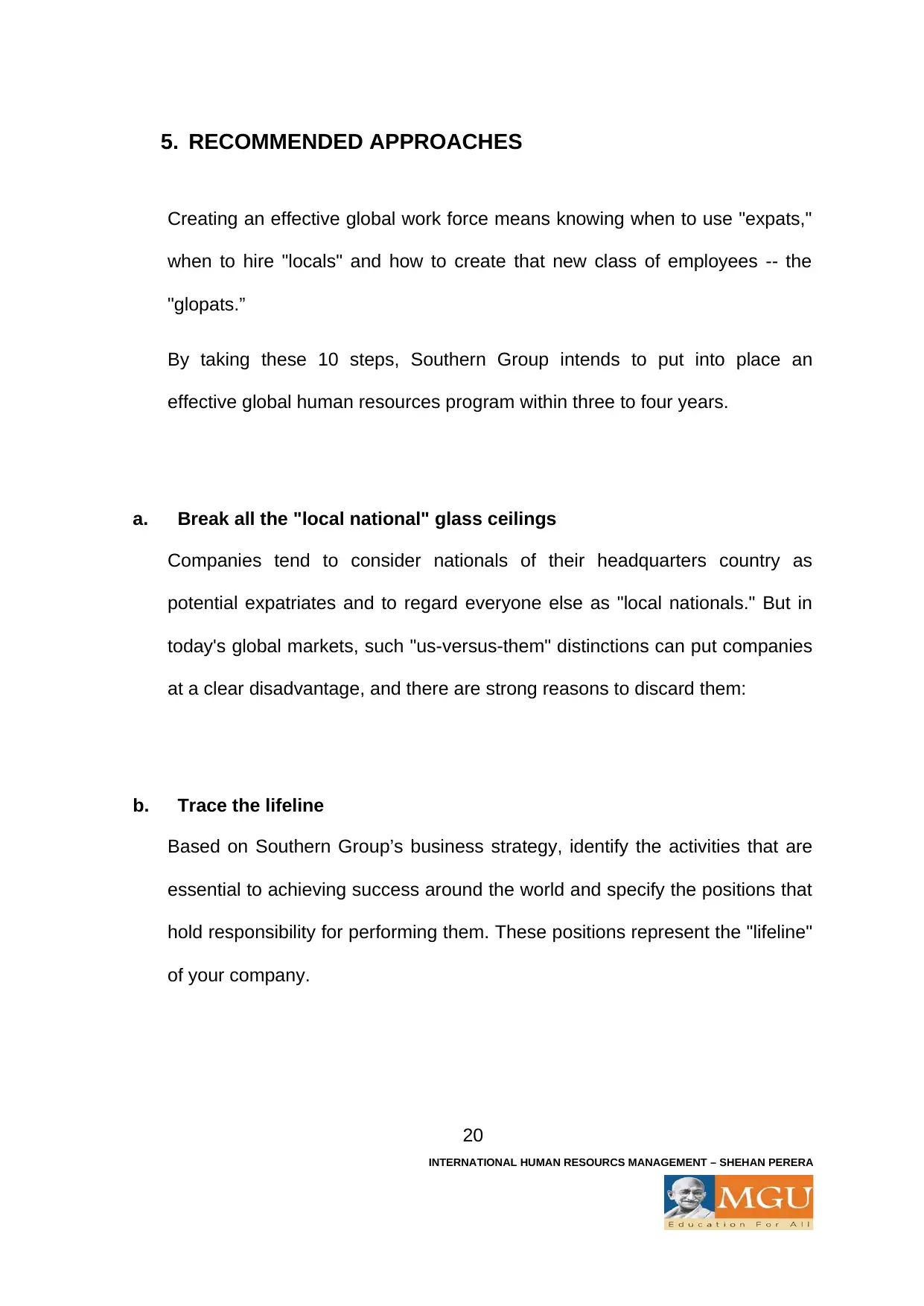
5. RECOMMENDED APPROACHES
Creating an effective global work force means knowing when to use "expats,"
when to hire "locals" and how to create that new class of employees -- the
"glopats.”
By taking these 10 steps, Southern Group intends to put into place an
effective global human resources program within three to four years.
a. Break all the "local national" glass ceilings
Companies tend to consider nationals of their headquarters country as
potential expatriates and to regard everyone else as "local nationals." But in
today's global markets, such "us-versus-them" distinctions can put companies
at a clear disadvantage, and there are strong reasons to discard them:
b. Trace the lifeline
Based on Southern Group’s business strategy, identify the activities that are
essential to achieving success around the world and specify the positions that
hold responsibility for performing them. These positions represent the "lifeline"
of your company.
20
INTERNATIONAL HUMAN RESOURCS MANAGEMENT – SHEHAN PERERA
Creating an effective global work force means knowing when to use "expats,"
when to hire "locals" and how to create that new class of employees -- the
"glopats.”
By taking these 10 steps, Southern Group intends to put into place an
effective global human resources program within three to four years.
a. Break all the "local national" glass ceilings
Companies tend to consider nationals of their headquarters country as
potential expatriates and to regard everyone else as "local nationals." But in
today's global markets, such "us-versus-them" distinctions can put companies
at a clear disadvantage, and there are strong reasons to discard them:
b. Trace the lifeline
Based on Southern Group’s business strategy, identify the activities that are
essential to achieving success around the world and specify the positions that
hold responsibility for performing them. These positions represent the "lifeline"
of your company.
20
INTERNATIONAL HUMAN RESOURCS MANAGEMENT – SHEHAN PERERA
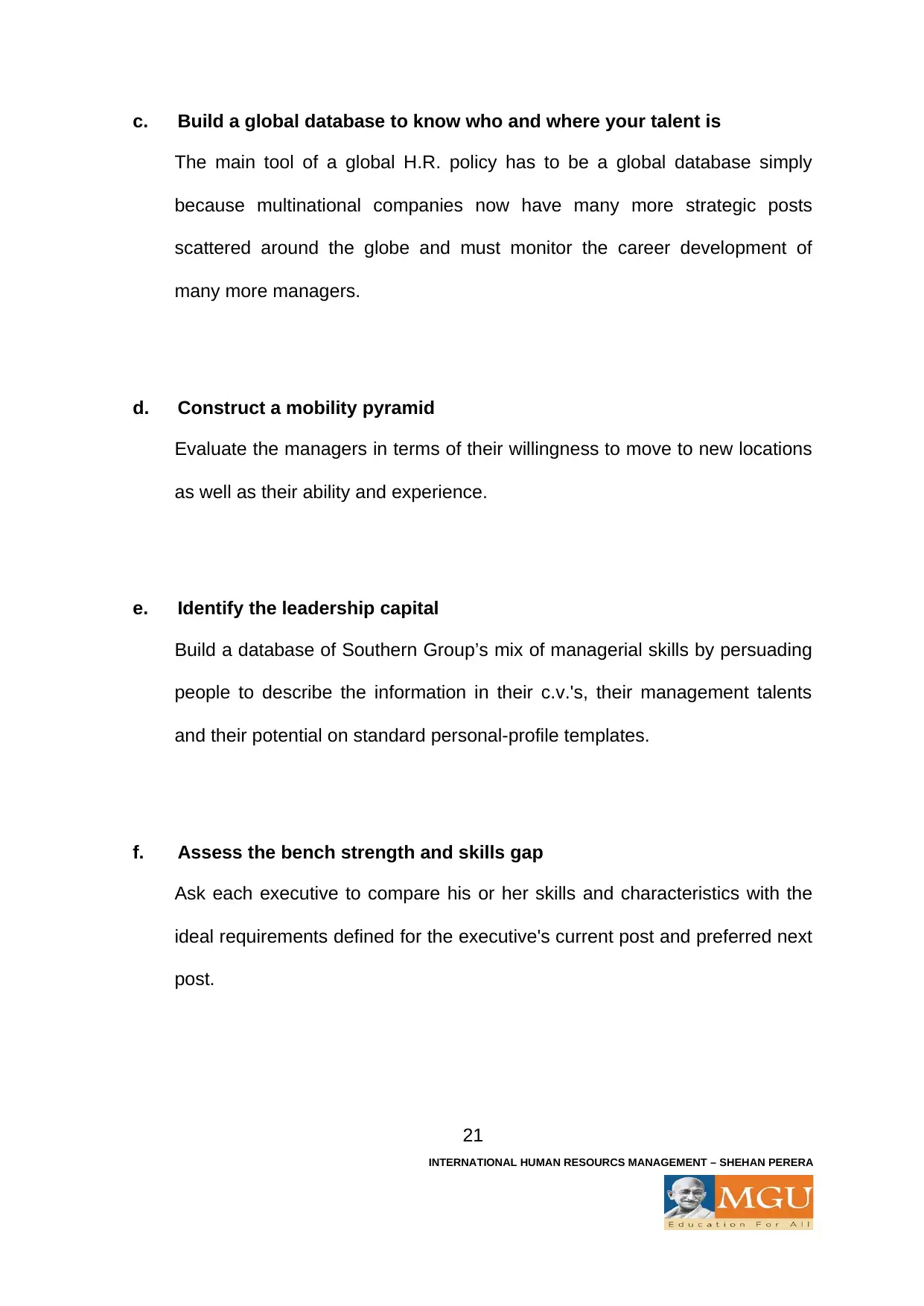
c. Build a global database to know who and where your talent is
The main tool of a global H.R. policy has to be a global database simply
because multinational companies now have many more strategic posts
scattered around the globe and must monitor the career development of
many more managers.
d. Construct a mobility pyramid
Evaluate the managers in terms of their willingness to move to new locations
as well as their ability and experience.
e. Identify the leadership capital
Build a database of Southern Group’s mix of managerial skills by persuading
people to describe the information in their c.v.'s, their management talents
and their potential on standard personal-profile templates.
f. Assess the bench strength and skills gap
Ask each executive to compare his or her skills and characteristics with the
ideal requirements defined for the executive's current post and preferred next
post.
21
INTERNATIONAL HUMAN RESOURCS MANAGEMENT – SHEHAN PERERA
The main tool of a global H.R. policy has to be a global database simply
because multinational companies now have many more strategic posts
scattered around the globe and must monitor the career development of
many more managers.
d. Construct a mobility pyramid
Evaluate the managers in terms of their willingness to move to new locations
as well as their ability and experience.
e. Identify the leadership capital
Build a database of Southern Group’s mix of managerial skills by persuading
people to describe the information in their c.v.'s, their management talents
and their potential on standard personal-profile templates.
f. Assess the bench strength and skills gap
Ask each executive to compare his or her skills and characteristics with the
ideal requirements defined for the executive's current post and preferred next
post.
21
INTERNATIONAL HUMAN RESOURCS MANAGEMENT – SHEHAN PERERA
Paraphrase This Document
Need a fresh take? Get an instant paraphrase of this document with our AI Paraphraser
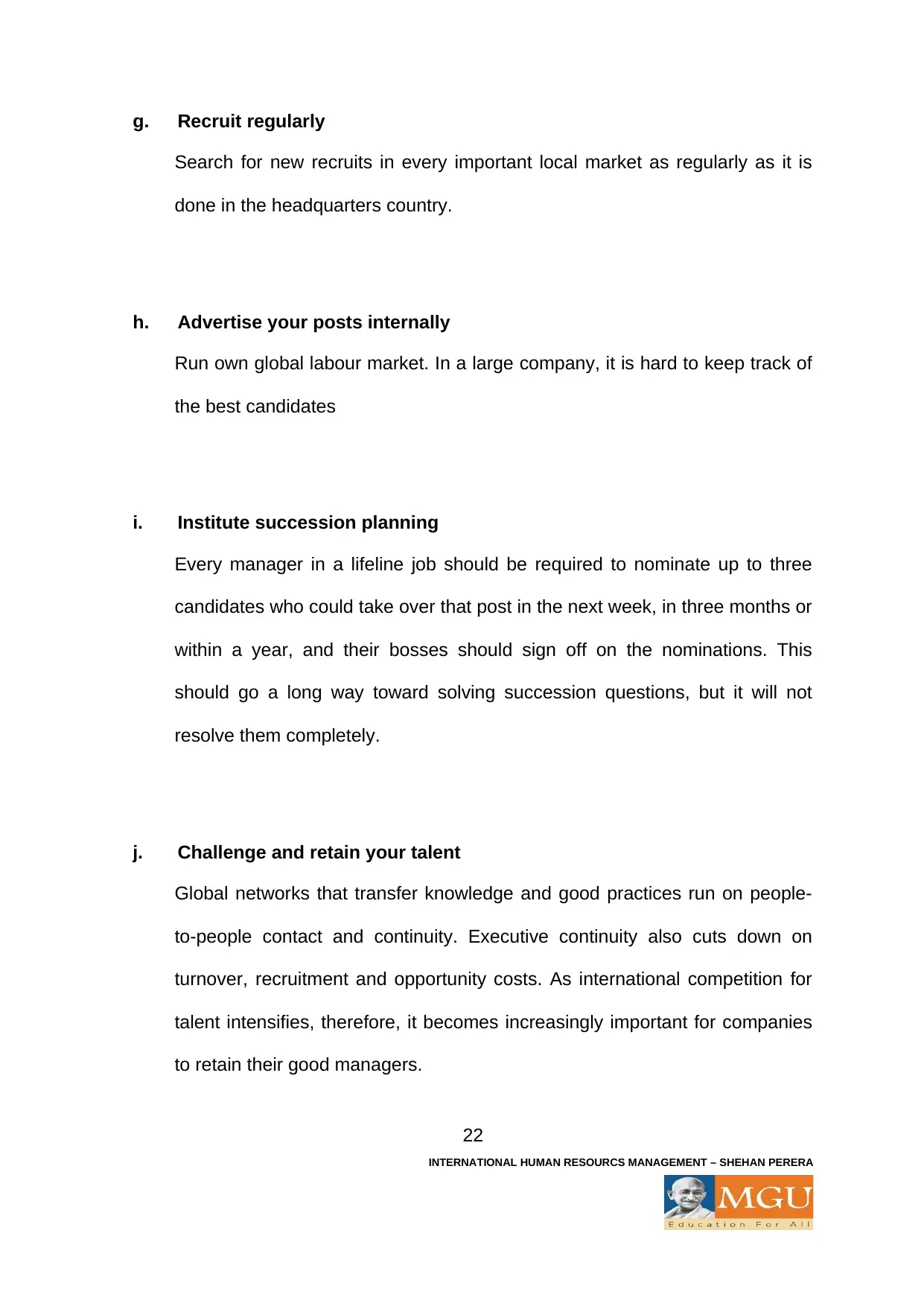
g. Recruit regularly
Search for new recruits in every important local market as regularly as it is
done in the headquarters country.
h. Advertise your posts internally
Run own global labour market. In a large company, it is hard to keep track of
the best candidates
i. Institute succession planning
Every manager in a lifeline job should be required to nominate up to three
candidates who could take over that post in the next week, in three months or
within a year, and their bosses should sign off on the nominations. This
should go a long way toward solving succession questions, but it will not
resolve them completely.
j. Challenge and retain your talent
Global networks that transfer knowledge and good practices run on people-
to-people contact and continuity. Executive continuity also cuts down on
turnover, recruitment and opportunity costs. As international competition for
talent intensifies, therefore, it becomes increasingly important for companies
to retain their good managers.
22
INTERNATIONAL HUMAN RESOURCS MANAGEMENT – SHEHAN PERERA
Search for new recruits in every important local market as regularly as it is
done in the headquarters country.
h. Advertise your posts internally
Run own global labour market. In a large company, it is hard to keep track of
the best candidates
i. Institute succession planning
Every manager in a lifeline job should be required to nominate up to three
candidates who could take over that post in the next week, in three months or
within a year, and their bosses should sign off on the nominations. This
should go a long way toward solving succession questions, but it will not
resolve them completely.
j. Challenge and retain your talent
Global networks that transfer knowledge and good practices run on people-
to-people contact and continuity. Executive continuity also cuts down on
turnover, recruitment and opportunity costs. As international competition for
talent intensifies, therefore, it becomes increasingly important for companies
to retain their good managers.
22
INTERNATIONAL HUMAN RESOURCS MANAGEMENT – SHEHAN PERERA
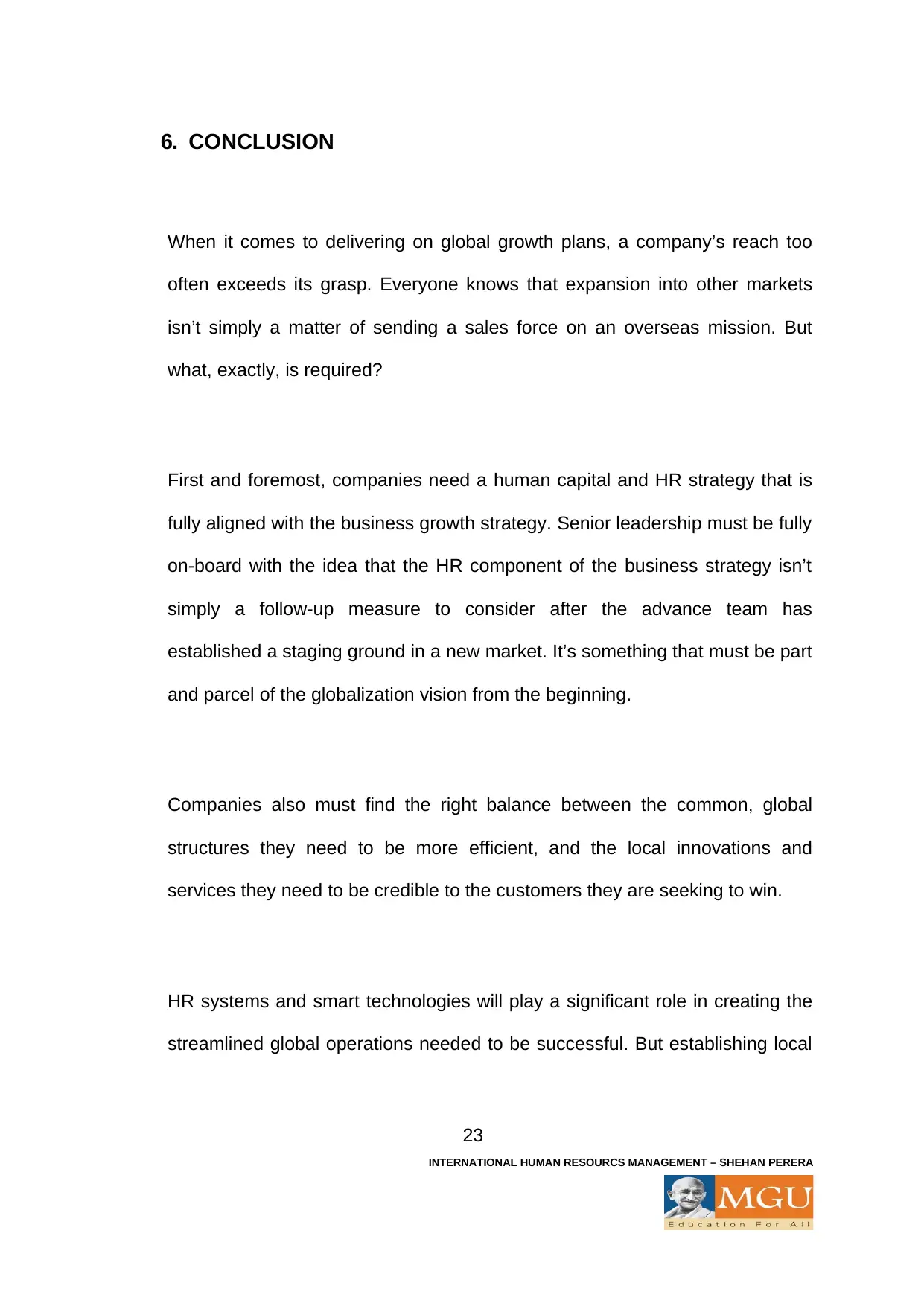
6. CONCLUSION
When it comes to delivering on global growth plans, a company’s reach too
often exceeds its grasp. Everyone knows that expansion into other markets
isn’t simply a matter of sending a sales force on an overseas mission. But
what, exactly, is required?
First and foremost, companies need a human capital and HR strategy that is
fully aligned with the business growth strategy. Senior leadership must be fully
on-board with the idea that the HR component of the business strategy isn’t
simply a follow-up measure to consider after the advance team has
established a staging ground in a new market. It’s something that must be part
and parcel of the globalization vision from the beginning.
Companies also must find the right balance between the common, global
structures they need to be more efficient, and the local innovations and
services they need to be credible to the customers they are seeking to win.
HR systems and smart technologies will play a significant role in creating the
streamlined global operations needed to be successful. But establishing local
23
INTERNATIONAL HUMAN RESOURCS MANAGEMENT – SHEHAN PERERA
When it comes to delivering on global growth plans, a company’s reach too
often exceeds its grasp. Everyone knows that expansion into other markets
isn’t simply a matter of sending a sales force on an overseas mission. But
what, exactly, is required?
First and foremost, companies need a human capital and HR strategy that is
fully aligned with the business growth strategy. Senior leadership must be fully
on-board with the idea that the HR component of the business strategy isn’t
simply a follow-up measure to consider after the advance team has
established a staging ground in a new market. It’s something that must be part
and parcel of the globalization vision from the beginning.
Companies also must find the right balance between the common, global
structures they need to be more efficient, and the local innovations and
services they need to be credible to the customers they are seeking to win.
HR systems and smart technologies will play a significant role in creating the
streamlined global operations needed to be successful. But establishing local
23
INTERNATIONAL HUMAN RESOURCS MANAGEMENT – SHEHAN PERERA
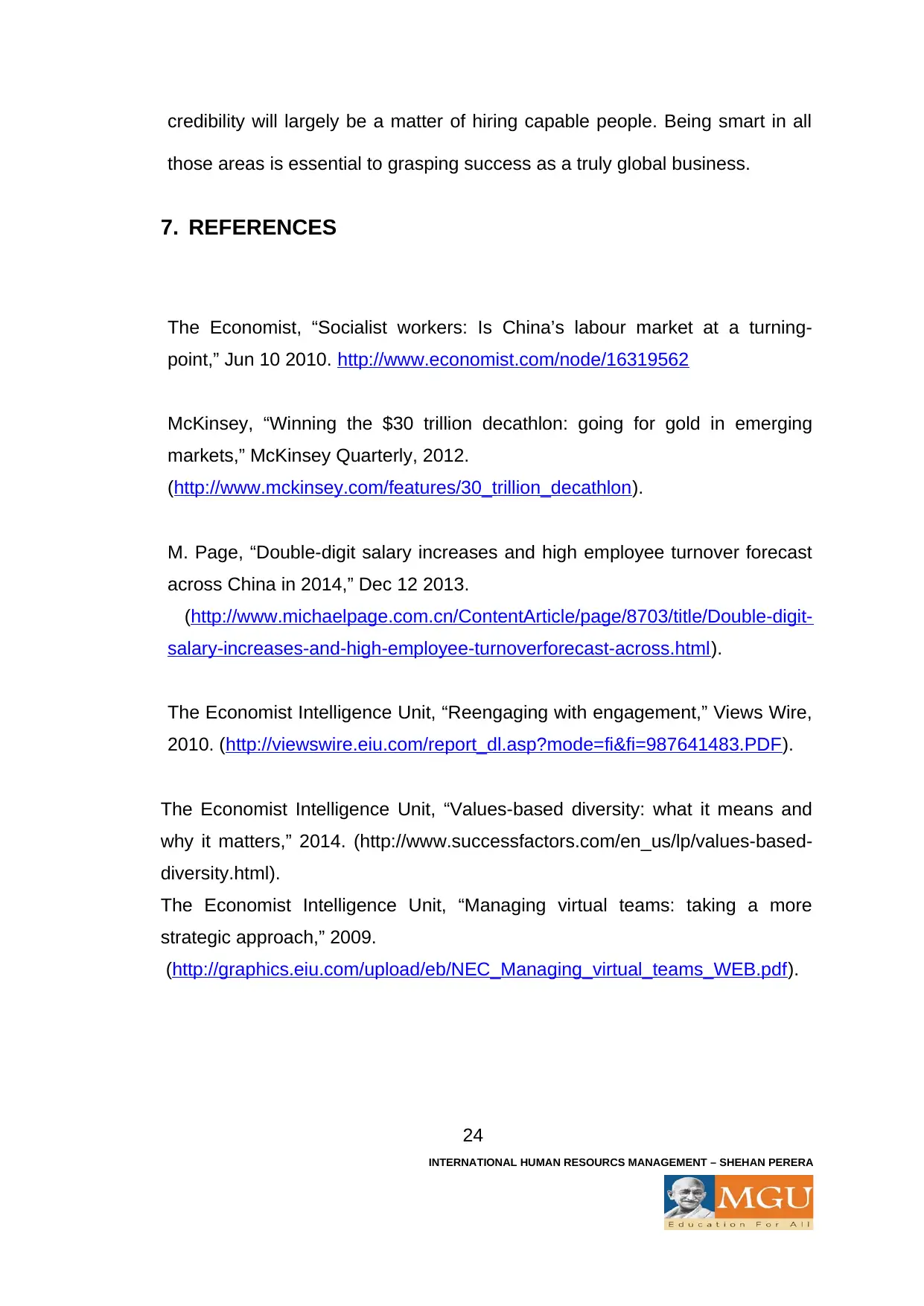
credibility will largely be a matter of hiring capable people. Being smart in all
those areas is essential to grasping success as a truly global business.
7. REFERENCES
The Economist, “Socialist workers: Is China’s labour market at a turning-
point,” Jun 10 2010. http://www.economist.com/node/16319562
McKinsey, “Winning the $30 trillion decathlon: going for gold in emerging
markets,” McKinsey Quarterly, 2012.
(http://www.mckinsey.com/features/30_trillion_decathlon).
M. Page, “Double-digit salary increases and high employee turnover forecast
across China in 2014,” Dec 12 2013.
(http://www.michaelpage.com.cn/ContentArticle/page/8703/title/Double-digit-
salary-increases-and-high-employee-turnoverforecast-across.html).
The Economist Intelligence Unit, “Reengaging with engagement,” Views Wire,
2010. (http://viewswire.eiu.com/report_dl.asp?mode=fi&fi=987641483.PDF).
The Economist Intelligence Unit, “Values-based diversity: what it means and
why it matters,” 2014. (http://www.successfactors.com/en_us/lp/values-based-
diversity.html).
The Economist Intelligence Unit, “Managing virtual teams: taking a more
strategic approach,” 2009.
(http://graphics.eiu.com/upload/eb/NEC_Managing_virtual_teams_WEB.pdf).
24
INTERNATIONAL HUMAN RESOURCS MANAGEMENT – SHEHAN PERERA
those areas is essential to grasping success as a truly global business.
7. REFERENCES
The Economist, “Socialist workers: Is China’s labour market at a turning-
point,” Jun 10 2010. http://www.economist.com/node/16319562
McKinsey, “Winning the $30 trillion decathlon: going for gold in emerging
markets,” McKinsey Quarterly, 2012.
(http://www.mckinsey.com/features/30_trillion_decathlon).
M. Page, “Double-digit salary increases and high employee turnover forecast
across China in 2014,” Dec 12 2013.
(http://www.michaelpage.com.cn/ContentArticle/page/8703/title/Double-digit-
salary-increases-and-high-employee-turnoverforecast-across.html).
The Economist Intelligence Unit, “Reengaging with engagement,” Views Wire,
2010. (http://viewswire.eiu.com/report_dl.asp?mode=fi&fi=987641483.PDF).
The Economist Intelligence Unit, “Values-based diversity: what it means and
why it matters,” 2014. (http://www.successfactors.com/en_us/lp/values-based-
diversity.html).
The Economist Intelligence Unit, “Managing virtual teams: taking a more
strategic approach,” 2009.
(http://graphics.eiu.com/upload/eb/NEC_Managing_virtual_teams_WEB.pdf).
24
INTERNATIONAL HUMAN RESOURCS MANAGEMENT – SHEHAN PERERA
1 out of 28
Related Documents
Your All-in-One AI-Powered Toolkit for Academic Success.
+13062052269
info@desklib.com
Available 24*7 on WhatsApp / Email
![[object Object]](/_next/static/media/star-bottom.7253800d.svg)
Unlock your academic potential
© 2024 | Zucol Services PVT LTD | All rights reserved.




